#plays playwrights comedy drama musical
Explore tagged Tumblr posts
Text
PSA for new Pagans❗️🚩🚩🚩
(Overlooked pagan holidays)


Paganism isn't a singular religion,
it is an umbrella term for thousands of different pre-christian polytheistic faiths that span Antiquity. Heathenry (Norse polytheism) Mesopotamian, Phonecian, Hellenic Polytheism, Kemeticism/Netjerism, Slavic Polytheism, Celtic, Roman, Basque, etc. It goes on and on. Sometimes, these religions are even combined or synchronized, like Greco-Egyptian polytheism.
So, no, not all pagans celebrate Yule, or Beltane, or whatever.
Yule itself seems to be more of a Wiccan (new age) revival than a continued tradition.
There are quite literally thousands of holidays and traditions celebrated that no one talks about because people, especially newer converts, seem to believe paganism is its own singular religion.
So, here are some of my favorite holidays I celebrate that aren't usually talked about:

The Anthesteria:
A 3 day drunken celebration in honor of Dionysus and the Dead. Houses would be decorated with spring flowers, ghosts swept from the home; feasting and drinking no matter your status, and offerings given to the Dead and the Furies so that may not harm you, as they were said to roam the earth at this time.
Tar/pitch was also spread onto doorframes and black hellebore was hung to protect the home.
It was held each year from the 11th to the 13th of the month of Anthesterion, around the time of the first full moon of the year.
The Haloea:
The closest Greek equivalent of "Yule" celebrating the winter solstice and which honored Demeter, the goddess of agriculture, crops, fertility, and harvest.
During the festival, people would celebrate by preparing a rich meal with dough cakes in the shape of genitalia, telling lusty jokes and swearing with vulgarity, singing, drinking, and dancing.
The festival took place in Athens and ended in Eleusis during the month of Poseideon, which is December.
The Dionysia:
where plays originated! Comedy, tragedy, and drama.
The Festival of Dionysus, otherwise known as the “Greater Dionysia” took place in the spring (around our March) when playwrights would compete to entertain Athenian citizens,
complete with parades of giant phalluses and sacrifices of bulls!
The Feat of Sekhmet:
an annual festival at the beginning of the year, which began around August for the Egyptians following Wep Ronpet, or the New Year.
The festival was a time of drunkeness with red beer and wine, where Egyptians would dance, play music.
The goal was to imitate the drunkenness that had once stopped the goddess Sekhmet from destroying humanity.
According to Egyptian mythology, Sekhmet became so bloodthirsty from humanity betraying her father Ra, that she nearly destroyed all humans on Earth. The other deities asked Ra to stop her, and he eventually pacified her by making her believe the wine or beer was blood and she drank herself to sleep, turning into either Hathor or Bastet.
the Aphrodisia:
The festival of Aphrodite! The festival occurred during the month of Hekatombaion, which modern scholars recognize as starting from the third week in July to the third week of August.
the first ritual of the festival would be to purify the temple with the blood from a dove, the sacred bird of Aphrodite. Afterwards, worshipers would carry sacred images of the goddess, as well as Peitho, in a procession to be washed.
During the festival it was not permitted to make bloody sacrifices, since the altar could not be polluted with the blood of the sacrifice victims, which were usually white male goats.
This of course excludes the blood of the sacred dove, made at the beginning of the ritual to purify the altar. In addition to live male goats, worshipers would offer fire, flowers, and incense.
This was even celebrated in Thebes, Egypt, where Aphrodite had a large cult following.
Wep Ronpet:
Wep Ronpet is the Kemetic New Year.
It falls usually somewhere btwn late July and mid-August. The date for Wep Ronpet varies each year, as it is marked by the rising of Sopdet, modernly known as Sirius. Wep Ronpet is in fact one day long.
However, there are 5 days of excitement leading up to Wep Ronpet that we typically call the Epagomenal Days, or the Intercalary Days.
The Epag. days came about from a myth where Nut got pregnant with 5 kids. Ra got upset about this and forbade her from giving birth on any day of the year. Thoth, being the tricky guy that he is played a game of Senet with the moon, and upon winning this game of Senet, he received a small portion of the moon which he used to create an extra 5 days which she can use to birth her five children.
Traditionally, these days are said to be a little weird because they are ‘outside of the norm’. Usually great care was taken not to take too many risks.
So, each day is dedicated to the god that was born on that particular day. The order that it goes in is:
Osiris
Heru-wer (Horus the Elder)
Set
Aset
Nebhet (Nephthys)
Normally, celebrations of Wep Ronpet include prayers to Sekhmet against the 7 arrow or plagues of the year: libations and offerings to the Netjeru, song, dance, feast.
Ritual bathing for purification is sometimes done afterwards.
Personally, I like to perform execration, banishing all the illness, negativity and harm from the previous and coming year.
#ancient history#hellenic pagan#paganism#paganblr#psa#polytheism#Greco egyptian polytheism#ancient greece#pagan community#dionysus#aphrodite#sekhmet#new year#hellenic polytheism#hellenic deities#hellenic polythiest#helpol
176 notes
·
View notes
Photo
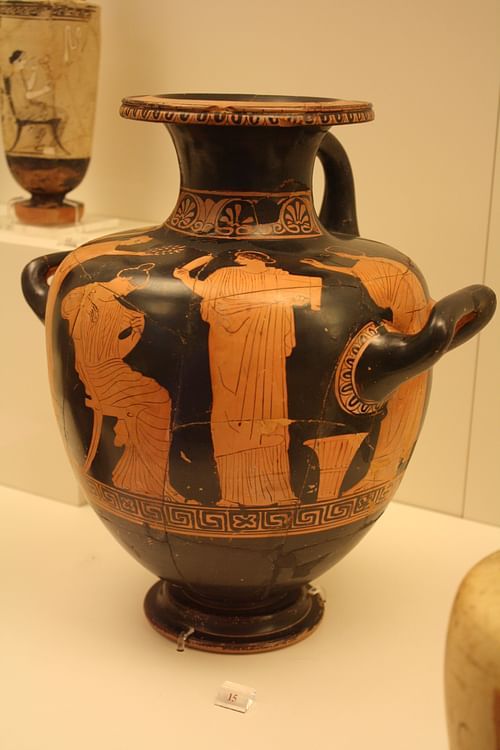
Ecclesiazusae
The Ecclesiazusae (aka Assemblywomen) is a comedy play written by Aristophanes, one of the great Greek comic playwrights. Written sometime between 393 and 391 BCE, it is, along with his play Wealth, one of only two he wrote after the Athenian defeat in the Peloponnesian War. In 403 BCE a new democratic government was reestablished in Athens; however, continued conflicts with Sparta had drawn heavily on both the finances of the city and its manpower. The future of the city remained in question. In the Ecclesiazusae Aristophanes proposed a unique solution: turn the running of the government over to the women of the city. As in his play Lysistrata, the central character of the play is a strong-willed woman - Praxagora. Together with other wives, who are disguised as men, she presents her ideas at the Assembly of Athens and convinces the men to relinquish control of the government. As the newly appointed commander, Praxagora quickly enacts a series of radical changes: community property, communal dwellings and meals, and no brothels. Reluctantly, many of the men quickly adapt to the new order of things. Of course, the possibility that women might rule in a city where they could not normally even vote and Aristophanes' use of that notion for comedy is indicative of just how male-dominated the society of ancient Athens was.
Life of Aristophanes
Aristophanes was one of the best examples of the “grace, charm, and scope” of Old Attic Comedy. Unfortunately, his works from this period are the only ones known to exist - only eleven of his plays have survived. Very little is known of his early life. Since most of his plays were written between 427 and 386 BCE, it helps place his death around 386 BCE. A native of Athens, he was the son of Philippus and owned land on the island of Aegina. He had two sons, one of whom became a playwright of minor comedies. Although participating little in Athenian politics, Aristophanes was an outspoken critic, via his plays, of the Peloponnesian War between Athens and Sparta and those politicians who supported it. His portrayal and attack of the statesman Cleon in the play The Babylonians landed him in court in 426 BCE. Author Edith Hamilton, in her book The Greek Way, said that Aristophanes wore the “halo of Greece” and that all of life could be seen in the plays of Aristophanes; politics, war, pacifism, and religion.
By the time Aristophanes began to write, Greek drama was in serious decline. Although Aristophanes is sometimes condemned for bringing drama down from the high-level of the tragedian Aeschylus, his plays, with their simplicity and vulgarity, have been recognized and appreciated for their rich fantasy as well as humor and indecency. Editor Moses Hadas in his book Greek Drama wrote that while Aristophanes could write poetry that was delicate and refined, he could also, at the same time, demonstrate bawdiness and gaiety. To many his comedies were a blend of wit and invention. Although somewhat quiet on the subject of Athenian politics, Aristophanes opposed all changes in the traditional aspects of philosophy, education, poetry, and music. Norman Cantor in his book Antiquity said the playwright reflected the conservative opinion of many Athenians, showing them to be people who valued old simplicity and morality. In short, they viewed all new innovations as being subversive.
Continue reading...
30 notes
·
View notes
Text
David Tennant's Plays: An Experienced Woman Gives Advice (1995)
I haven't done a thread on any of David's plays in a while, so I had some time yesterday to rustle one up about his 1995 play, An Experienced Woman Gives Advice. It premiered 28 years ago yesterday (which was why I chose to do a deeper dive about it) so let's get into it! An Experienced Woman Gives Advice (I'll use EW to refer to the play from here on out because what a long title!) would be David's first time performing onstage at the Royal Exchange Theatre in Manchester.
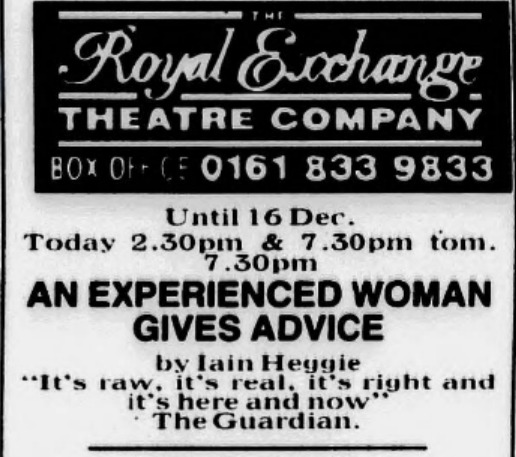


Prior to winning his role in EW, the last play David had done was What The Butler Saw as Nicholas Beckett, a role he was warmly praised for. What The Butler Saw ran for two months at five different venues around England before closing its run at the Nottingham Theatre Royal in late May 1995.
EW's playwright, Iain Heggie, had seen phenomenal success with his 1987 tour-de-force, A Wholly Healthy Glasgow. But in the years afterwards, Heggie had produced only a few more plays before deciding he'd rather go back to teaching and let his writing commence at its own pace.
Originally written as a miniature sex comedy, EW was long in development, and received further script development workshops at the Royal Scottish Academy of Music and Drama in Glasgow in 1992, and at the Traverse Theatre in Edinburgh in 1993.
Its world premiere would see Heggie's return to the stage.
Initially, it might have seemed odd that EW - with its Glasgow setting, Scottish writer, and fully Scottish cast - didn't make its debut in Scotland. But because Heggie and the Royal Exchange had similar actor-centered outlooks and many of the artistic directors in Scotland preferred a more visual style, Heggie chose to work with the Royal Exchange (who liked his work anyway) and the play made its debut in Manchester.
Previews for EW began at the Royal Exchange Manchester on 21 November 1995, with an opening day of 23 November 1995. It had a small cast of five: Siobhan Redmond as Bella, David Tennant as Kenny, Jenny McCrindle as Nancy, Alastair Galbraith as Irving, and Alexander Morton as Stick. It was directed by Matthew Lloyd, and its assistant director was Marianne Elliott.
The set, which was designed by Laurie Dennett, was quite sparse - a communal back garden and garden shed of a block of Glasgow tenement flats. The music was composed by Paddy Cunneen, who fans will recognize from many other projects he did with David, some of which I've previously done deep dives into (like Sunburst Finish, The Pillowman and Bite).
The three-act play had a runtime of 3 hours and 20 minutes, with two intervals - one 15 minutes in length, the other 10 minutes in length. It closed its run on 16 December 1995. Tickets were priced from £5.50 to £18, with matinees on Wednesdays and Saturdays.
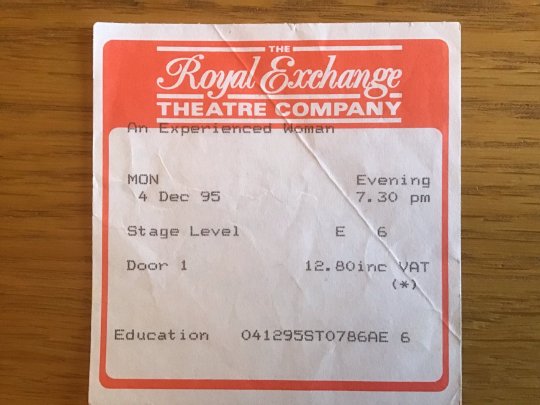
The action takes place on two Sunday mornings and opens with Bella, who's a 39 year old teacher, gardening in her back garden. We learn she's in a three-year long relationship with a live-in toyboy lover, Kenny (DT) who's a former pupil and 15 years younger than her. And that he didn't come home the previous night.
Bella calls Kenny her "charming, fallible boy", and she treats him like one. Former lovers say he's "tall, kind of blond, with a lovely lean build" and "incredibly rich brown eyes." There’s "just no resisting him,” and he's "bastardly good looking.”

David in rehearsals as Kenny (from program of An Experienced Woman Gives Advice)
In a series of interruptions from people passing into the garden, Bella (Redmond) dispenses advice to the inquiring strangers Nancy and Irving (Galbraith), and learns Kenny spent the night with another woman...from the woman herself, Nancy (McCrindle), who doesn't realize who she's told. What Bella does with this information - and how her meticulously cultivated freedom of choice lifestyle shatters, especially given her first love, Stick (Morton) lives nearby - is what the rest of the play explores. We see love, lust, and lies play out as Bella makes her choices.
And there's a scene with Bella and Kenny...and sex behind the doors of a rocking, exploding garden shed!
I haven't been able to locate a production script of the play to see whether this scene was enacted onstage, but Heggie's published script book says this scene, where Bella strips Kenny of his clothes piece by piece before they go into the shed to have sex offstage, had some brief nudity. None of the play reviews I've been able to find mention any nudity, though one article about the play does state that due to "strong language and the sexual nature of the story, the play is not suitable for children under 15." (I don't know how much weight I should give this particular article, however, because it also calls the lead character "Maggie" rather than "Bella"!) Anyway, if this scene was included in the play, it would be the second known instance (the first being that now-infamous What The Butler Saw full frontal nude photograph) where DT was onstage in the buff!
Speaking of reviews, they were wildly different - some found it hilariously funny with barbed, sharp dialogue, while others found it fatiguing. David's "able portrayal" as Kenny was praised as part of an extremely talented cast, and his was called a "great performance".
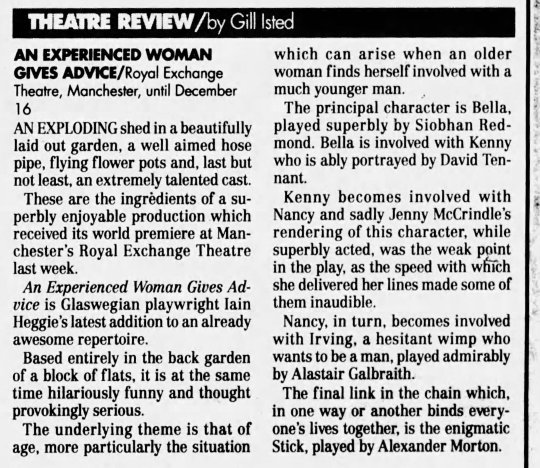

David and Siobhan Redmond earned Manchester Evening News Theatre Awards (MENTA) nominations - Redmond for Best Actress, and David for Best Actor in a Supporting Role. They also earned British Regional Theatre Awards nominations; Redmond for Best Actress and David for Best Actor. The play itself was also awarded a MENTA nomination for Best New Play. Redmond won both her nominations; David and the play didn't.
Photos from the play are almost nonexistent. I haven't located any images housed in any archives anywhere...so far. That doesn't mean they're not out there, mind you, just I haven't found them yet! I did manage to find a few of horrible quality while digging around in newspaper archives (I'll refrain from venting here about the quality aspects of digitizing newspapers, as that's a rant for another day) but it's a damned shame. I mean, in one of these, David just looks like a David-shaped black hole with floating arms! Nevertheless, I'll leave them here.
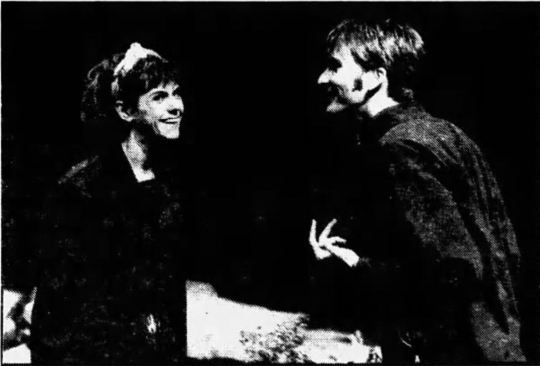
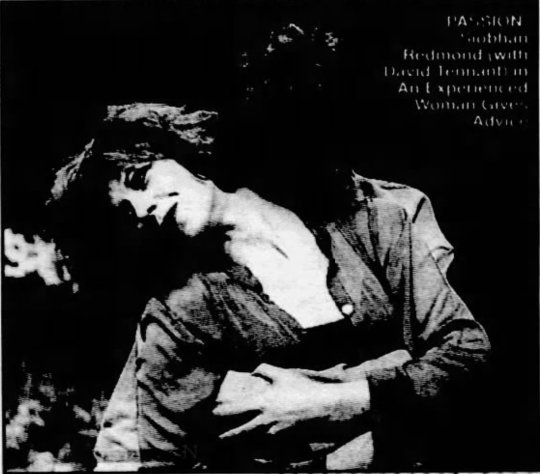
Something else I found fascinating during my research was that, like many venues, the Royal Exchange had a tradition of scheduling at least one informal discussion with the director and members of the company for each of their productions. While I didn't find any information on whether a discussion of this sort occurred during EW's run, I have to assume it did. Ah, to be a fly on the wall for that!
And that, my friends, is pretty much the story of An Experienced Woman Gives Advice! I wish I knew much more about this play, but like many parts of David's theatre career, wide gaps in our knowledge remain. But I keep on looking.
Thanks for reading!
#DavidTennant#ObscureDavidTennantPerformances#DavidTennantEarlyTheatre#AnExperiencedWomanGivesAdvice
25 notes
·
View notes
Text
Here's a thing I listened to this week that I won't stop thinking about for some time. It was written by Gill Adams, who's Lucy Beaumont's mother, and performed by Lucy Beaumont. I's the first thing Lucy Beaumont ever did in showbusiness. It aired on BBC Radio 4 in 2000, long before Lucy Beaumont started stand-up.
It is, I must warn any Lucy Beaumont fans who click on this, definitely not a comedy show. It's a one-woman radio play, a fictional script about a pregnant teenager, played by Lucy. There's a lot of soundscape stuff in the audio drama, but Lucy's the only voice actor, and she does an amazing job.
I said early on that this feels like an Alan Bennett thing to me, with Lucy listing off the quaint things he teenage character likes to do in the wintertime. However, it takes a sharp turn away from Alan Bennett and into being very fucking dark.
I found this article very interesting:
but I'm glad I didn't read it until after I'd listened to the radio show, because it has a lot of spoilers. I got genuinely caught up in the drama of the radio play, wanting to know what would happen as it got increasingly intense, and I'm glad I didn't get that spoiled before I listened to it. So if anyone is interested, I recommend listening to the radio show first, but then reading that spoiler-heavy Guardian article. It gives interesting context to why Gill Adams wrote it, and how her relationship with her daughter/performer informed it.
I still find Lucy Beaumont interesting, the puzzle of how much her comedy persona is or isn't a character. The question that I once worried was misogynistic, since everyone asked this question when she was on Taskmaster even though she sat right next to Sam Campbell and no one doubted that he was acting daft on purpose, so why not give a woman credit for that too? Until I heard her ComCom episode in which she swore up and down that she genuinely believes some ludicrous things. Then I heard the Perfect Brains episode with her mother and decided... okay, I don't think it is a character. I think she's just had the type of wild up-bringing that can make someone very intelligent, very competent and savvy at quite a few things, and also be as messed up as someone would have to be to talk the way Lucy Beaumont does while not being a character. That's interesting. I'm not super into her stand-up, but I'd love to read her autobiography.
This radio play is not, in any way, her autobiography, to be clear. Her mother explains in the Guardian article about why she wrote it, in response to dehumanizing headlines about pregnant teenagers. But this play is a hell of a thing for someone to be able to perform as well as Lucy Beaumont did, while being as young as she was - I think she was 17 or 18 when she recorded this. That's a lot of talent, from her and from her mother for writing it.
Anyway, I won't get too into describing the show itself, because I think people should listen to it and I don't want to spoil it. I'll just say, trigger warning for a fair bit of fucked up stuff set to 90s music.
3 notes
·
View notes
Text


On 23rd October 1940 playwright, poet and jazz musician, Tom McGrath, was born.
McGrath was born and grew up in Rutherglen, his early influences included the slapstick comedy of the music halls, and later, American beat literature and music.
Tom went to London In the early 60’s to take part in the emerging counter culture at the time, and by 1962 his first poems were published. In 1965 Tom participated in the first International Poetry Olympics at the Royal Albert Hall with Allen Ginsberg, and Gregory Corso amongst others, which became a legendary event. In 1966 Tom was asked to become the founder Editor of the seminal International Times. In the late 60’s Tom returned, with his wife and children to his native Glasgow, and studied English and Drama at Glasgow University. It was here that he met fellow writers and collaborators, Tom Leonard and Alan Spence.
Tom was an accomplished musician, with a love of Jazz and blues. In 1972 he was asked to be the Musical Director for the Great Northern Welly Boot Show starring Billy Connelly. By 1973 Tom was appointed as the first artistic Director of the Third Eye Centre, Glasgow, which still exists as the CCA today. In 1976 Tom established himself as a playwright with Laurel and Hardy and began a long association with the Traverse Theatre, Edinburgh. In 1977 he worked with a newly released Jimmy Boyle on The Hard Man, which premiered at the Traverse before a run in London.
In the early 1980’s Tom was instrumental in founding the Tron Theatre Club, later to become the Tron Theatre. In the late 1980’s he became the Scottish Arts Council’s Associate Literary Director, based at the Royal Lyceum Theatre, Edinburgh. It was here that Tom supported and nurtured a new generation of playwrights and poets, including David Harrower, David Greig, Douglas Maxwell and Zinnie Harris. Tom was also writing his own plays, many which were produced by the Lyceum, The Traverse and Tramway.
In 2004 Tom established the Playwrights Studio Scotland to continue his work supporting and inspiring the next generation of writers. He also continued to write, and in 2005 he wrote My Old Man for Magnetic North Theatre Company.
2 notes
·
View notes
Text
The Evolution of Entertainment From Ancient Times to the Digital Era
Entertainment has always been an essential part of human culture, offering a respite from daily life and a chance to experience joy, wonder, and emotional connection. From ancient civilizations to the current digital age, Entertainment has undergone dramatic transformations, reflecting shifts in technology, culture, and society. This article explores the rich history of entertainment, tracing its roots, its evolution through various epochs, and the ways in which modern-day entertainment continues to captivate and evolve.
Ancient Beginnings of Entertainment
The desire for entertainment is as old as civilization itself. Early humans entertained themselves through storytelling, music, dance, and games. In prehistoric times, cave paintings might have served both a ritualistic purpose and an early form of visual entertainment. The ancient Egyptians held grand festivals and celebrations, filled with music, food, and dance, while the Greeks and Romans elevated entertainment to new heights with theater, gladiatorial games, and chariot races.
Theater in ancient Greece, particularly during festivals like Dionysia, showcased plays that ranged from tragedies to comedies. Playwrights like Sophocles and Aristophanes became cultural icons, and their works laid the foundation for modern drama. Meanwhile, the Roman Colosseum became a center of violent but highly popular entertainment, where gladiators fought to the death, and massive battles were recreated for the audience’s enjoyment. These events were not merely pastimes but also social rituals that bound people together in shared experiences.
Entertainment in the Middle Ages and the Renaissance
With the decline of the Roman Empire, the Middle Ages saw a shift in entertainment that reflected the era's religious and social structures. Religious ceremonies, morality plays, and festivals continued to provide entertainment, often with a strong focus on moral lessons and community engagement. Troubadours and minstrels roamed Europe, singing songs of love, valor, and adventure, which kept people connected to their cultural roots despite widespread political instability.
The Renaissance, however, marked a flourishing of the arts, and entertainment became more intellectual and varied. The printing press, invented by Johannes Gutenberg in the 15th century, revolutionized access to literature and knowledge, allowing the masses to experience stories and ideas beyond their immediate environment. Theater also grew in prominence during this period, with the works of Shakespeare, Cervantes, and Dante establishing the standards for narrative and character development that continue to influence literature and entertainment to this day.
The Rise of Mass Entertainment in the 19th and 20th Centuries
The 19th century saw the birth of new forms of entertainment designed to appeal to a wider audience. With the Industrial Revolution came a shift from agrarian societies to urban centers, leading to the rise of public spaces like theaters, opera houses, and music halls where large groups could gather to be entertained. The advent of photography and, later, motion pictures in the late 1800s revolutionized visual entertainment. The Lumière brothers’ invention of the cinematograph in 1895 gave rise to the motion picture industry, leading to the silent films of the early 20th century and later the golden age of Hollywood.
Cinema quickly became one of the most dominant forms of entertainment, offering people a glimpse into different worlds, cultures, and ideas. Stars like Charlie Chaplin, Marilyn Monroe, and James Dean became cultural icons, influencing fashion, behavior, and attitudes. Radio and, subsequently, television became the next major platforms for entertainment in the 20th century. These technologies brought music, news, and serialized dramas directly into people's homes, creating a new communal experience around entertainment.
Music, too, experienced a revolution with the invention of the phonograph and the rise of recorded sound. Jazz, rock ‘n’ roll, and pop music transformed the cultural landscape, with artists like Elvis Presley, The Beatles, and Michael Jackson shaping not just entertainment but entire cultural movements. The 20th century’s advances in technology allowed for the mass production and distribution of entertainment, making it accessible to people of all walks of life.
The Digital Era: Streaming, Social Media, and Gaming
The 21st century has brought about perhaps the most significant transformation in entertainment: the digital revolution. The internet has democratized entertainment, allowing creators from all over the world to reach global audiences. Streaming services like Netflix, YouTube, and Spotify have changed the way people consume media. No longer bound by television schedules or theater release dates, viewers can access films, TV shows, and music whenever they want, often in binge-watching marathons that were unheard of just a few decades ago.
Social media platforms like Instagram, TikTok, and Twitter have turned ordinary people into entertainers. Influencers, YouTubers, and content creators can amass huge followings, sometimes rivaling traditional movie stars or musicians. The interactive nature of these platforms allows audiences to engage directly with entertainers, blurring the line between creators and consumers.
Video games have also risen to unprecedented popularity, becoming a dominant form of entertainment. Games like "Fortnite," "Minecraft," and "The Legend of Zelda" have large, dedicated fanbases and offer immersive worlds that provide not just passive entertainment but interactive experiences. With the advent of virtual reality (VR) and augmented reality (AR), the boundaries of entertainment are being pushed even further, creating immersive experiences that were once the stuff of science fiction.
The Future of Entertainment
As technology continues to evolve, so will entertainment. Artificial intelligence (AI) is already being used to create music, write scripts, and even produce visual art, raising questions about the future of creativity and human involvement in entertainment. Virtual reality and augmented reality are likely to become even more integrated into our daily lives, offering new ways to experience stories, games, and even live events like concerts or sports.
Moreover, the rise of the "metaverse" — a collective virtual space where people can interact in real time — could radically change the way we think about entertainment. In the metaverse, entertainment won’t just be something we consume; it will be something we live inside, interacting with others in real-time virtual environments that blur the lines between reality and fiction.
In conclusion, entertainment has come a long way from the early days of storytelling around a fire to today’s immersive digital experiences. As technology and culture continue to evolve, so too will the ways in which we entertain ourselves. What remains constant, however, is humanity's deep desire for stories, music, games, and experiences that bring joy, connection, and a sense of wonder to our lives.
2 notes
·
View notes
Text
"Unable to write overtly about homosexual relationships, playwrights like Coward and Rattigan wrote in a kind of code." I DONT AGREE! I DONT AGREE!!!!!!!!!!! im more familiar with coward, so ill be referring to him. i see this point of view so often with no firsthand account from coward relaying this. maybe it's an appropriate assumption to make, but i think my POV is likely as well. the POV being that ... noel coward was a product of his conditions. he studied and created contemporary and past theatre and film and music, and he lived in an intensely heteronormative society his entire life -- what homosexual example was there of art in the 30s and 40s? more directly, why would he want to make a homosexual play? to what audience? if the whole point is that his charm lay in "plausible deniability" -- camp and comedy and illusion, both coded and OBVIOUS queerness which YOU pointed out was even read by contemporary seemingly-oblivious critics -- why take that away from him as an inevitable product of censorship? which is to say, why give the credit to the censorship? it's like saying coward would not have been coward if not for the homophobia. which i dont agree with. it brings up a completely fantastical world where what-ifs lead nowhere
anyway this thesis is actually really fun to read. im just sensitive about this one specific thing LOL. "Queer comedy: Laughter and stigma; fear and rebellion in modern and contemporary drama" by Anthony Chase for State University of New York at Buffalo, 2007 (i love looking up academics and seeing they have flourishing careers. Hell yeah)
4 notes
·
View notes
Text
Struggles, Inspirations, and Masterpieces of Ukrainian Cinema (Part 2)
For more than a year and a half, Ukraine has been in the headlines because of the war. But Ukraine is more than its fight against Russia – it is also a nation of talented people and culture.
UkraineWorld spoke with Ukrainian film producer Nadia Parfan about the film industry in Ukraine, its struggles, inspirations, and masterpieces. Learn more about must-watch Ukrainian movies in the second part of our analysis.
Must-watch Ukrainian movies
Ukrainian classics are the first thing worth attention. This includes 20th-century cinema. Ukraine has a long and rich cinematic tradition. In the 1920s, Ukrainian films produced by the Odesa film studio were commissioned or sold to Hollywood and all over the world.
Earth by Oleksandr Dovzhenko. The movie has a restored version with a soundtrack by Daha Braha, a famous Ukrainian ethno-house band. It’s a perfect sound for an originally silent movie.
Shadows of Forgotten Ancestors by Serhiy Parajanov. Serhiy Parajanov is an Armenian born in Georgia, Tbilisi, but is Ukrainian in his heart. He has a very interesting identity.
This identity is very important now, especially in terms of emphasizing that Ukrainians are a political nation, and it’s a political choice that we all make to be Ukrainians. It doesn’t matter who you are ethnically. Serhiy Parajanov made this choice.
Parajanov is a founding father of a style called Ukrainian poetic cinema. And this is a landmark film he made.
Another film is Hunt for the Cossack Gold by Vadym Kastelli. It is a forgotten classic from the 1990s rediscovered recently. It’s a comedy about a modern-day person who inherited treasures from Cossack times, turning him into a millionaire. But then British intelligence gets involved. It’s a very funny, ironic film.
Another classical comedy about Cossacks is The Lost Letter. It’s rooted in traditional Ukrainian culture and humor with a lot of music and jokes.
Modern fiction films
My Thoughts Are Silent and Luxembourg Luxembourg by Antonio Lukich are two tragicomedies definitely worth watching. Another one is Stop-Zemlia by Kateryna Hornostay, a teenage drama that won a Silver Bear at the Berlinale film festival.
Bad Roads by Nataliia Vorozhbyt is a collection of short stories that Nataliia wrote and directed. The film is her directorial debut. She’s a very famous playwright whose plays have been staged in the UK and in many theaters across the world.
She shows mastery of deep psychological dialogues and talks about the existential dimension of war and what it does to humankind. Some of her novels are very tough and dramatic, while others are funny.
I Work at the Cemetery by Oleksii Taranenko. A tragicomedy, which is a favorite Ukrainian genre. It has good humor, and a strong script, but it’s also a very nice portrait of Kyiv. You can get to know Kyiv, the capital of freedom and the capital of democracy in the modern world.
Documentaries
The Living Fire by Ostap Kostyuk, who also joined the army and who is a defender now. This remarkable Ukrainian documentary is about shepherds who have lived in the Carpathian mountains, work with sheep, and sustained authentic mountain traditions for generations.
The War Note by Roman Liubyi. This film is about the previous stage of the war that started in 2014. It’s a very special film created from cell phone footage shot by the soldiers themselves. Roman took this footage and edited it into a film.
It’s very funny and very tragic at the same time. He shows what it means to be at war, and what kind of civilization war creates in the 21st century.
Enter Through the Balcony by Roman Blazhan. A short film famous both in Ukraine and abroad. It’s a very sweet, warm, and ironic exploration of Ukrainian balconies and urban life.
It’s an architecture film that talks about how Ukrainians reinvent their balconies. And through talking about something as trivial as a balcony, you come to understand modern Ukrainian city life and our civilization.
Heat Singers by Nadia Parfan. This is a music documentary that talks about the municipal service workers, who sustain our life. During wartime, this work has become a sort of everyday heroism that is normally invisible.
We notice when something is not working properly, but when everything’s fine, we just take it for granted. In this film, we understand the other side.
It is especially valuable now, in wartime, because when you live in a Ukrainian city that is being bombed, you see how the sites of strikes, and damage, and ruins are miraculously transformed back to normal within one or two days by the municipal workers.
They are real heroes of our time.
Most of these films are available on Takflix, the Ukrainian streaming platform, with English subtitles.
ANASTASIIA HERASYMCHUK, ANALYST AND JOURNALIST AT UKRAINEWORLD
NADIA PARFAN, UKRAINIAN FILM PRODUCER
6 notes
·
View notes
Text


FOR IMMEDIATE RELEASE: July 6, 2023
Contact: Chris Boneau/ Amy Kass / Michelle Farabaugh / Kenya Williams
Follow MTC on Twitter, Instagram, TikTok and Facebook
Follow BBB on Twitter, Instagram, and Facebook
Download Press Materials Here
Manhattan Theatre Club
Announces Full Casting for the
New York Premiere of
Poor Yella Rednecks
By Qui Nguyen
Directed by May Adrales
Previews begin Tuesday, October 10, 2023
Opening on Wednesday, November 1, 2023
At MTC at New York City Center – Stage I
Lynne Meadow (Artistic Director) and Chris Jennings (Executive Director) are pleased to announce the full cast for the New York Premiere of Poor Yella Rednecks, written by Qui Nguyen (Vietgone) and directed by May Adrales (Vietgone, Golden Shield). Poor Yella Rednecks will begin previews on Tuesday, October 10 and open on Wednesday, November 1, 2023 at New York City Center – Stage I (131 West 55th Street).
The cast of Poor Yella Rednecks will feature Jon Hoche (Vietgone, Life of Pi), Ben Levin (Vietgone, “Kung Fu”), Samantha Quan (Vietgone), Jon Norman Schneider (The Coast Starlight), Maureen Sebastian (The Best We Could: A Family Tragedy), and Paco Tolson (Vietgone).
The creative team for Poor Yella Rednecks includes Tim Mackabee (Scenic Design), Valérie Thérèse Bart (Costume Design), Lap Chi Chu (Lighting Design), Shane Rettig (Original Music & Sound Design), Jared Mezzocchi (Projection Design), David Valentine (Puppet Design), Kenny Seymour (Arrangements), and Alyssa K. Howard (Production Stage Manager).
Qui Nguyen, the wildly inventive playwright (and screenwriter for Marvel and Disney) known for his use of pop culture, pop music and puppetry, reunites with his frequent director, May Adrales, for this funny, sexy and brash new play. A young Vietnamese family attempts to put down roots in Arkansas, a place as different from home as it gets. A mom and dad balance big hopes and low-wage jobs, as old flings threaten to pull them apart. It all makes for a bumpy road to the American dream. From the world of Nguyen’s Vietgone, with its comic book and action movie influences, comes a play that melds a deeply personal story with the playwright’s trademark, killer humor. The New York Times hails the writer’s work as “culturally savvy comedy,” and this production shows you why.
Poor Yella Rednecks is co-commissioned by South Coast Repertory and Manhattan Theatre Club. Support for MTC’s production of Poor Yella Rednecks is provided by the Howard Gilman Foundation and Laurents/Hatcher Foundation. Developed in part in Center Theatre Group’s Writers’ Workshop.
The 2022-23 season marked Lynne Meadow’s 50th Anniversary as Artistic Director of MANHATTAN THEATRE CLUB. Meadow was recently joined at the helm of MTC by Executive Director Chris Jennings, who succeeded Executive Producer Barry Grove. MTC’s mission, which Meadow created in 1972 and has implemented since, is to develop and present new work in a dynamic, supportive environment; to identify and collaborate with the most exciting new as well as accomplished artists; and to produce a diverse repertoire of innovative, entertaining, and thought-provoking plays and musicals by American and international playwrights. Since 1989, MTC Education, which uses the power of live theatre and playwriting to awaken minds, ignite imaginations, open hearts, and change lives, has also been an important part of our work.
Over five decades, MTC has grown from a small off-off-Broadway showcase into one of the country’s most prestigious and award-winning theatre companies, creating approximately 600 world, American, New York and Broadway premieres. Our productions have earned 7 Pulitzer Prizes, 28 Tony Awards, 50 Drama Desk Awards and 49 Obie Awards amongst many other honors. Our Broadway home is the Samuel J. Friedman Theatre (261 West 47th Street) and Off-Broadway at New York City Center (131 West 55th Street). MTC is an anti-racist organization that respects and honors all voices, and upholds the values of community and equity, For more information, please visit www.ManhattanTheatreClub.com.
TICKETING INFORMATION
Joining MTC’s season of plays is easy! Just call the MTC Clubline at 212-399-3050 or go to www.manhattantheatreclub.com. Group Sales available now, contact Joanna Lee at [email protected]. Single Tickets on Sale September 5.
BIOGRAPHIES
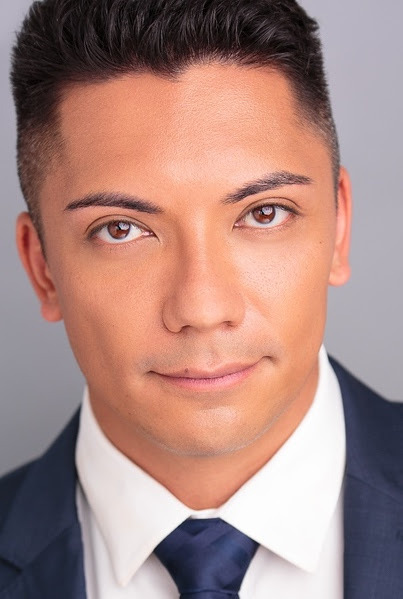
JON HOCHE returns to MTC after performing in the Off-Broadway Premiere of Vietgone and has collaborated with playwright Qui Nguyen for over a decade. Other credits include - Broadway: Life of Pi (Richard Parker Puppeteer, Associate Puppetry and Movement Director), King Kong: Alive on Broadway (Voice of King Kong/Puppeteer). Off-Broadway: Little Shop of Horrors (Audrey 2 puppeteer); Soft Power (The Public Theater - Grammy Nominated); Vietgone (Manhattan Theatre Club); Soul Samurai, The Inexplicable Redemption of Agent G (Ma-Yi Theater/Vampire Cowboys Theater); Hello, From the Children of Planet Earth (Playwright’s Realm). National Tour: Warhorse (Puppeteer/Puppet Captain). Regional: Revenge Song (Geffen Playhouse). TV: “Hello Tomorrow!” (Apple TV+) - @JonHoche
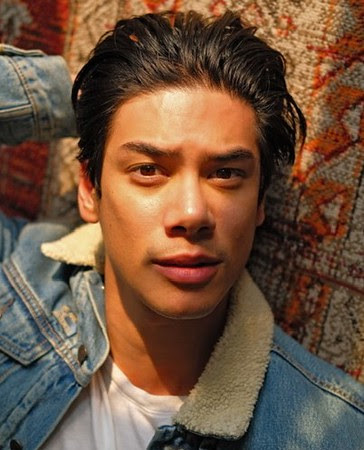
BEN LEVIN’s MTC debut. Ben just wrapped a season-long arc on the CW series “Kung Fu”. Prior to that, he starred in the series Legacies for four seasons. Selected TV credits include “Arrested Development”, “Love”, and a recurring role on ABC’s “Time After Time”. He appeared in a supporting role in the critically acclaimed Independent Spirit Award nominated feature Test Pattern. Ben can also be seen in the Freeform/Hulu feature Turkey Drop. Other features include Allegiant, Admission, and Mike Birbiglia’s indie comedy Sleepwalk with Me. He's thrilled to be reprising the role of Quang in Qui Nguyen’s Vietgone, after starring in the 2018 production at the San Diego Repertory. Ben is New York City born and raised and is a graduate of NYU's Tisch School of the Arts. Shout out to TADA Youth Theatre. In addition to acting, Ben makes music under the moniker Grasshapa, available wherever music is found.

SAMANTHA QUAN’s theatre credits include Poor Yella Rednecks (South Coast Rep); Vietgone (South Coast Rep, MTC); B.F.E. (Just Add Water Festival); Masha No Home (Ensemble Studio Theatre); An Infinite Ache (The Globe Theaters), workshops of To Red Tendons, Peerless, Hannah and the Dread Gazebo, Red Flamboyant, American Hwangap (Ojai Playwrights Conference); Monument: Or Four Sisters (A Sloth Play) (Boston Court New Works Festival). Television credits include “Home Before Dark”, “Elementary”, “NCIS”, “The Mentalist”, “Blue”, “Suburgatory”, “Castle”. Film credits include 4 Wedding Planners, Sake Bomb, Good Grief and How to Lose a Guy in 10 Days.
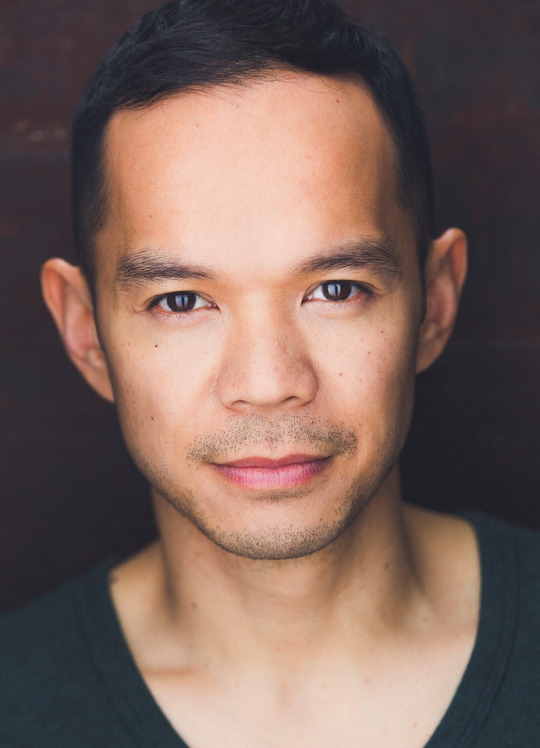
JON NORMAN SCHNEIDER most recently appeared onstage in Keith Bunin's The Coast Starlight at Lincoln Center Theater. Select New York credits include Catch As Catch Can (Playwrights Horizons), The Chinese Lady (The Public), Henry VI Parts 1-3 (NAATCO), Awake and Sing! (NAATCO/The Public), The Oldest Boy (Lincoln Center Theater), Lunch Bunch (Clubbed Thumb), A Map of Virtue (13P), among others. Regionally, he has worked at Actors Theatre of Louisville, The Alley, Alliance, Barrington Stage, Dorset Theatre Festival, The Goodman, Huntington, The Kennedy Center, Long Wharf, Magic, McCarter, Milwaukee Rep, Mosaic, Northern Stage, The Old Globe, and South Coast Rep. His film and TV credits include Bitter Melon, Manila Is Full of Men Named Boy, The Normals, HBO's Angel Rodriguez, “The Endgame”, "Jessica Jones", "Veep", "30 Rock" and "Law & Order: Criminal Intent".
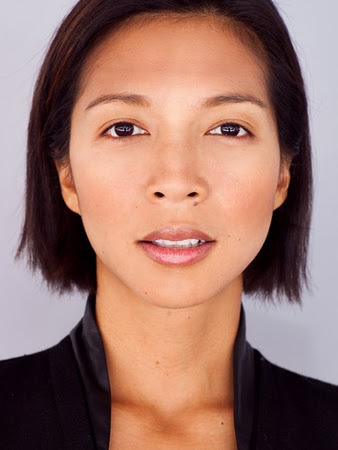
MAUREEN SEBASTIAN’s theatrical credits include, most recently, MTC’s The Best We Could: A Family Tragedy for which she received a Lucille Lortel nomination for Best Featured Performer in a Play; Vietgone (South Coast Repertory) ; Arabian Nights (Berkeley Repertory/Arena Stage); Thunder Above, Deeps Below (Eugene O’Neill Theatre Center/Second Generation); Now Circa Then (Ars Nova); Lonely, I’m Not and Year Zero (Second Stage); and Soul Samurai (Vampire Cowboys/Ma-Yi). Television credits include “Love Life” (HBO), “American Gothic” (CBS), and “Revolution” (NBC). She produced and starred in the web series “Pretty Precious Unicorns” and the short film “Second Province”. She co-created the podcasts “Gulp” and “A Guide to Freedom” with The North Star Fund. She is a member of May-Yi’s Writer’s Lab and The Gotham Film & Media Institute.
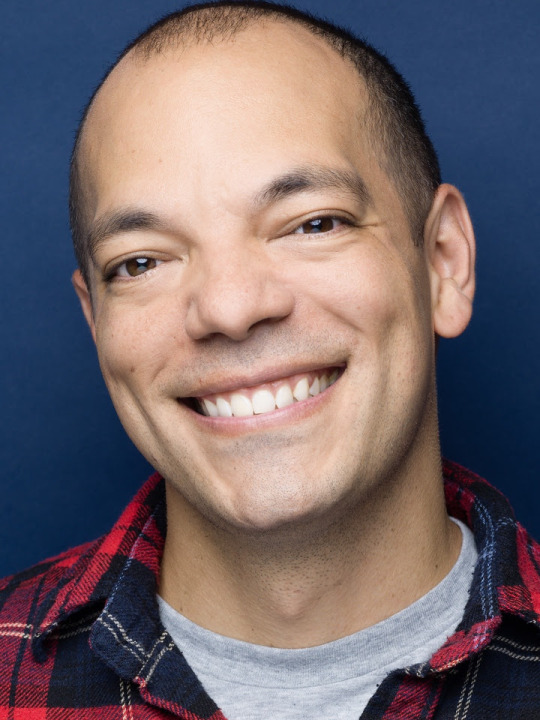
PACO TOLSON is thrilled to return to Manhattan Theatre Club where he received a Lortel nomination for his work in Qui Nguyen’s Vietgone. Paco and Qui have enjoyed an artistic collaboration of over 18 years, and Poor Yella Rednecks will mark their ninth full production together. Select Off-Broadway Credits: Fiasco Theater’s productions of Knight of the Burning Pestle (Red Bull), Twelfth Night and Pericles (Classic Stage Company); The Unwritten Song (EST); Slavey (Clubbed Thumb); The Children of Vonderly (MaYi Theater); Soul Samurai (Ma-Yi/Vampire Cowboys). Regional: to the yellow house (La Jolla Playhouse); Fiasco’s Measure for Measure (Actors Theatre of Louisville); The Winter’s Tale and Vietgone (OSF); Peter and the Starcatcher, Vietgone, and Poor Yella Rednecks (South Coast Rep). Audio: (There’s) No Time for Comedy (Playwrights Horizons), The Memory Motel (Two River Theater), Witness (Paramount/Gideon Media), Play On Shakespeare’s Henry V, The Tempest, and Measure for Measure (Next Chapter Podcasts). Film and TV credits include “Billions”, “Law & Order: Organized Crime”, “Law & Order: Criminal Intent”, “Prodigal Son”, “Search Party”, “The Good Fight”, “Madam Secretary”, “Happy!”, “The Code”, and 7 DAY GIG.

QUI NGUYEN (Playwright) is a playwright, screenwriter, and co-founder of the pioneering geek theatre company, Vampire Cowboys. His plays include Vietgone, Poor Yella Rednecks, Bike Wreck, and the critically acclaimed Vampire Cowboys shows Revenge Song, She Kills Monsters, Soul Samurai, The Inexplicable Redemption of Agent G, Alice in Slasherland, Fight Girl Battle World, Men of Steel, and Living Dead in Denmark. For TV/film, he’s written for Marvel Studios, Netflix, AMC, SYFY, and PBS. He most recently wrote Disney’s Raya and The Last Dragon (nominated for a 2022 Academy Award for Best Animated Feature), and he co-directed and wrote Disney's Strange World in 2022.
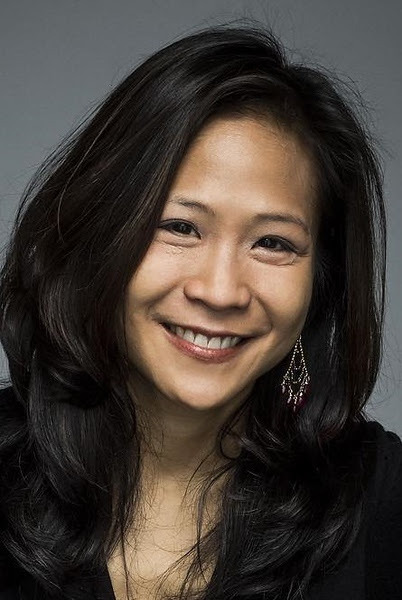
MAY ADRALES (Director) is a director, artistic leader, teacher and mother; she has directed over 25 world premieres nationally. Her work has been seen most recently at Second Stage (Rajiv Joseph’s Letters of Suresh), Manhattan Theatre Club (Anchuli Felicia King’s Golden Shield, Qui Nguyen’s Vietgone). Awards include: Ammerman Award at Arena Stage; TCG’s Alan Schneider award for freelance directors; Denham fellowship; New Generations Grantee. She is a Drama League Directing Fellow, Van Lier Fellow, WP Lab Director, SoHo Rep Writers/Directors Lab and New York Theater Workshop directing fellow. She served as an Associate Artistic Director at Milwaukee Rep; Artistic Associate at The Playwrights Center; Artistic Associate at The Public Theater; and Director of Artistic Programs and Artistic Director at The Lark. She serves on the board of Theater Communications Group. She is currently the Director of the Theatre Program and Assistant Professor at Fordham University. MFA, Yale School of Drama. (www.mayadrales.net)
# # # #
www.ManhattanTheatreClub.com
Follow MTC on Twitter, Instagram, TikTok and Facebook
Follow BBB on Twitter, Instagram, and Facebook
Exciting update! Ben will be making his Off-Broadway debut this Fall! Here is Manhattan Theatre Club's announcement on Instagram and the theatre's press agent BBB's press release that was sent to our magazine.
Poor Yella Rednecks website link:
4 notes
·
View notes
Text
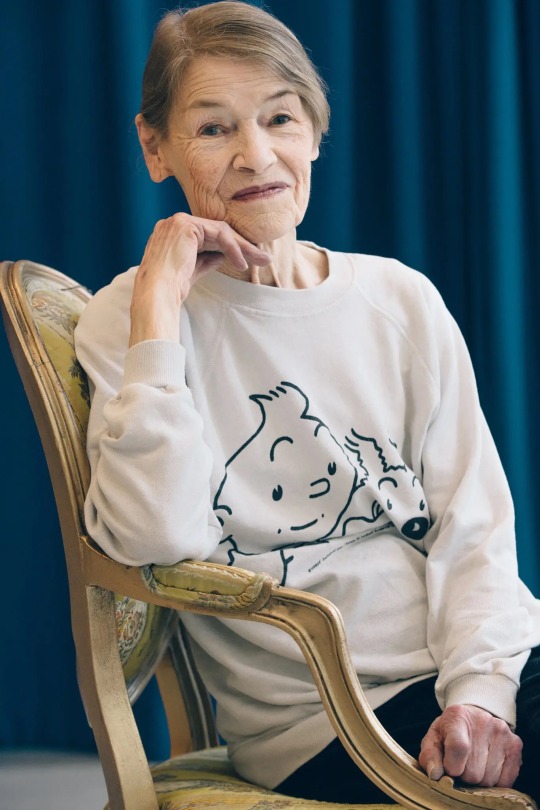
Glenda Jackson has died at the age of 87 after “a brief illness” at her home in London.
In a statement, her agent, Lionel Larner, said: “Glenda Jackson, two-time Academy Award-winning actress and politician, died peacefully at her home in Blackheath, London, this morning after a brief illness with her family at her side.”
Jackson bestrode the narrow worlds of stage and screen like a colossus over six decades. Though such a Shakespearean tribute would undoubtedly have had the famously curmudgeonly actor reaching for her familiar catchphrase: “Oh, come on. Good God, no,” nothing less will do for a star who emerged from a 23-year career break to play King Lear at the age of 82.
Not only did she win an Evening Standard theatre award for that performance, but she brought the audience to its feet by playing up to her ferocious reputation with an attack on the awards’ sponsor. For decades, the newspaper had scorned her as an actor, opposed her as an MP, she said, “so I’m left thinking what did I do wrong?”

Discovering that she liked acting, after being persuaded by a friend to join the local Townswomen’s Guild drama group, she applied to the one drama school she had heard of, Rada, with the proviso that she could only afford to go if she won a scholarship. She duly did. She was still a student there when she made her professional stage debut in the seaside town of Worthing in 1957, in a two-parter by Terence Rattigan, Separate Tables.
Six years as a jobbing actor and stage manager in repertory theatres around the country eventually brought her to the attention of the RSC, which she joined in 1964 just as the director Peter Brook was making a mark with a season entitled Theatre of Cruelty. He cast her in Peter Weiss’s Marat/Sade, as a prisoner assigned to play Marat’s assassin, Charlotte Corday, a performance that was recalled years later by the playwright David Edgar as one of the best he had ever seen, in a production that “changed British theatre for ever”.
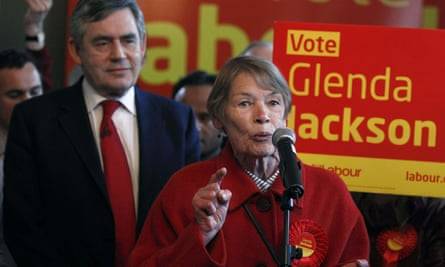
By the time she finished making Women in Love she was six months pregnant with her son, Dan, the only child of an 18-year marriage to fellow actor turned antique dealer Roy Hodges. But far from slowing down for a while, two years later she was back, in a rollercoaster of roles. Her achievements in 1971 included Tchaikovsky’s nymphomaniac wife in another Russell film, The Music Lovers; Queen Elizabeth I, in an influential TV six-parter Elizabeth R which won her two Emmys, and a mouthy, placard-wielding Cleopatra in the first of a series of comedy turns for the BBC’s Morecambe and Wise Show. In 1973 she won her second Oscar as sparring lover Vicki in the romantic comedy A Touch of Class.

Any ambitions she may have had for a lead role in government were banjaxed by her outspoken opposition to the Iraq war. Grandstanding opportunities were limited to occasions such as the death of Margaret Thatcher, when she cut through sentimental parliamentary etiquette with her own salty verdict on an ideology of “greed, selfishness, no care for the weaker, sharp elbows, sharp knees”.
She followed her triumphal return to the theatre as King Lear with another award-winning performance, as the shuffling, vituperative 92-year-old widow A, in a Broadway revival of Edward Albee’s Three Tall Women, and as Maud, the Alzheimer’s-struck protagonist of Elizabeth Is Missing (of which Guardian TV critic Lucy Mangan wrote that she was “wonderful, in that vanishingly rare way that can come only from next-level talent as razor-sharp as it ever was plus 40 years of honing your technique, whetting both blades on 80 years of life experience.”)
She forsook her north London stronghold in her later years for a basement flat in the south London home of her son, Dan Hodges – now a political columnist whose views were markedly different from her own – where she gardened, watched her grandson growing up, and continued to pour the finest sort of scorn on any passing folly or hypocrisy.
4 notes
·
View notes
Photo

John Turturro and John Goodman in Barton Fink (Joel Coen and Ethan Coen, 1991)
Cast: John Turturro, John Goodman, Judy Davis, Michael Lerner, John Mahoney, Tony Shalhoub, Jon Polito, Steve Buscemi. Screenplay: Joel Coen, Ethan Coen. Cinematography: Roger Deakins. Production design: Dennis Gassner. Film editing: Joel Coen, Ethan Coen. Music: Carter Burwell.
The Coen brothers are nothing if not audacious, and attempting something so outrageous and anomalous as Barton Fink at the beginning of their careers -- it was their fourth feature, after Blood Simple (1984), Raising Arizona (1987), and Miller's Crossing (1990) -- shows a certain amount of courage. It's a melange of satire, horror movie, comedy, thriller, fantasy, and fable that had many critics singing its praises. It was their first film to receive notice from the Motion Picture Academy, earning three Oscar nominations: supporting actor Michael Lerner, art directors Dennis Gassner and Nancy Haigh, and costume designer Richard Hornung. And it was the unanimous choice for the Palme d'Or at the 1991 Cannes Film Festival; Joel Coen also won as best director and John Turturro as best actor. Evidently it took everyone by surprise. But although it's a provocative and unsettling movie, there's not enough of any one element in the melange to suggest to me that it's more than the work of a couple of extraordinarily talented writer-directors riffing on whatever comes to their minds. Barton (Turturro) is a playwright whose hit on Broadway in 1941 gets him a bid to come work in Hollywood. There, studio head Jack Lipnick (Lerner) assigns him to write a wrestling picture for Wallace Beery. Stymied in his attempt to come up with a screenplay, Barton decides to pick the brain of a famous novelist who has also come to work in Hollywood, W.P. Mayhew (John Mahoney). The playwright, the studio head, and the novelist are all caricatures of Clifford Odets, Louis B. Mayer, and William Faulkner, respectively. Each caricature is well-done: What we see of Barton's play is a deft parody of the Odets-style leftist "little people" dramas like Waiting for Lefty and Awake and Sing! that Odets was known for. Lipnick is a rich, sentimental vulgarian with a mean streak, who like Mayer was born in Minsk. And Mayhew not only goes by the name "Bill," as Faulkner did among his friends and family, he also has a wife back home named Estelle, just as Faulkner did. Moreover, he is an alcoholic who is looked after in Hollywood by his mistress, Audrey Taylor (Judy Davis), who is clearly based on Faulkner's Hollywood mistress, Meta Carpenter. But then we have the turns into horror-fantasy when Barton tries to hole up in a Los Angeles hotel and makes friends with his next-door neighbor, an insurance salesman named Charlie Meadows (John Goodman). Good-time Charlie is later revealed to be a serial killer named Karl Mundt -- another of the Coens' in-jokes: The real-life Karl Mundt was a right-wing dunce who represented South Dakota (neighbor state to the Coens' Minnesota) in Washington from 1939 to 1973. Clearly, Barton Fink is not without a certain baroque fascination to it. It's the kind of film you can spend hours analyzing and annotating. But this makes it, for me, little more than a fabulous mess.
6 notes
·
View notes
Text
CURTAIN UP!
Lucy On Stage ~ Act 1
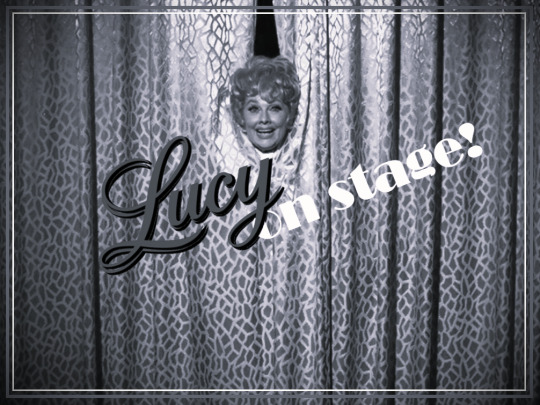
Lucille Ball’s dream was always to appear on Broadway. That dream didn’t become reality until 1960. In the meantime, if Lucy couldn’t go to Broadway, Broadway would come to Lucy - on her radio and television shows!
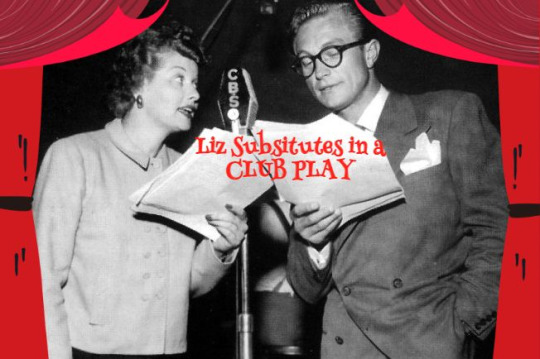
“The Milkmaid’s Dilemma or The Lady’s Not For Turning”
“Liz Substitutes in a Club Play” (1951) ~ In this episode of Lucille Ball’s radio sitcom MY FAVORITE HUSBAND, Liz (Lucille Ball) is determined to play the lead in the women’s club play, even if she has to keep the leading lady from showing up. There’s only one problem: Liz has learned the lines for the wrong play!
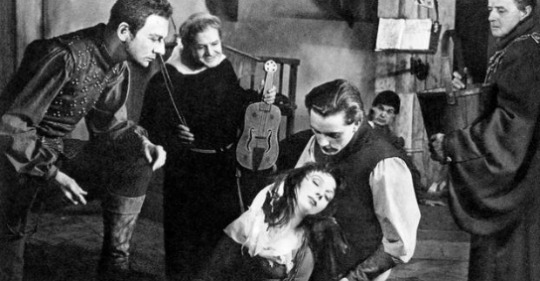
The title of the play is a pun on the play “The Lady’s Not for Burning” by Christopher Fry. It opened on Broadway just two months before this episode aired starring Richard Burton and John Gielgud, who also directed. Coincidentally, British Prime Minister Margaret Thatcher would say “the lady’s not for turning” in a now famous speech in October 1980.

“John’s Other Whistler”
“Liz’s Radio Script” (1951) ~ Liz's entry is a finalist in a playwriting contest, and the Coopers and the Atterburys perform it on the local radio station.

The title of Liz’s play combines two of the most popular radio shows of the time: “John's Other Wife” and “The Whistler”. Liz has retyped the script so quickly that there are some misspellings that lead to on-air goofs!
GEORGE: You’ve got a face like a camel. LIZ: That’s ‘cameo’!
IRIS: I don’t care. I’ve got another liver. LIZ: That’s ‘lover’! IRIS: At my age, I’d get more use out of another liver!
GEORGE: ...And your nose is continued on the next page!
This dialogue was later rewritten and recycled into...
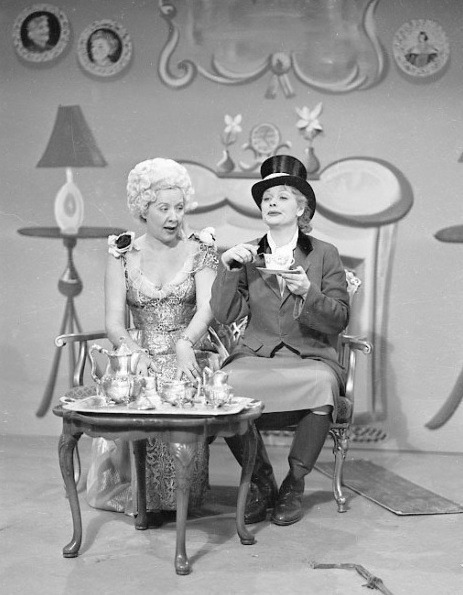
“The Perils of Pamela” / “A Tree Grows in Havana”
“Lucy Writes a Play” (1952) ~ Playwright Lucy pens a drama with a Cuban locale. She figures Ricky for the star. The hitch: he refuses the part. So she changes her play from Cuba to England and has Fred take Ricky’s spot. However, Ricky has decided to surprise Lucy and appear in the play… only problem is he has the wrong script!
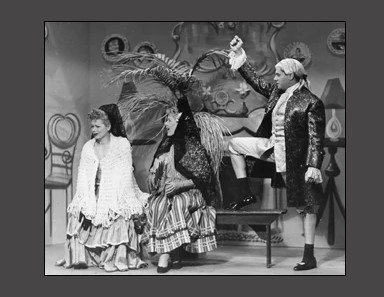
Voice from the Audience: I think it stinks!
The title “A Tree Grows in Havana” was inspired by A Tree Grows in Brooklyn, which was a book and a film in the mid-40's. There was even a Broadway musical of the same title starring Shirley Booth that closed two weeks before the episode filmed. Lucy rewrites the script into an English comedy titled "The Perils of Pamela", a nod to several films titled The Perils of Pauline directed by Lucille Ball’s friend George Marshall. Some sample dialogue from her rewritten opus:
LUCY: What's the mater, Matter? Uh, what's the matter, Mater?
LUCY: Pater won't be down for tea. We just buried him. Had to. Dead, you know.
FRED: Would you pour me a spot of tea, my dear louse? [looks at script closer] I mean Louise.

“The Pleasant Peasant”
“The Operetta” (1952) ~ The Wednesday Afternoon Fine Arts League is putting on an operetta and Lucy is in charge. As treasurer, she has no money in the club account so she has to write the show herself! Needless to say, Ricky and the Mertzes are in the cast as well.

Because the repo men come to take back the unpaid scenery and costumes, we never see the end of the operetta. According to Lucy’s description of the show, there were two acts, with 18 scenes in the first act alone. The plot involved Lily being kidnapped by highway men because their leader had been turned into a frog by a wicked witch. Lily is really the frog / leader’s long-lost sister, separated from him when they were tadpoles. Later the Prince (who thinks he’s a peasant but is really a frog) goes to work for Squire Quinn at the Inn on the River Out.
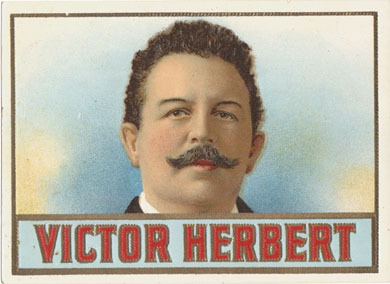
These are references to composers Sigmund Romberg and Rudolf Friml, as well as Charles John Thomas, a popular baritone of the time. In 1915 Thomas starred on Broadway in a Friml operetta called The Peasant Girl which included a song called “The Gypsy” sung by 'Celeste and Chorus.’ “The Pleasant Peasant” even includes a parody of “The Drinking Song” from Romberg’s The Student Prince.
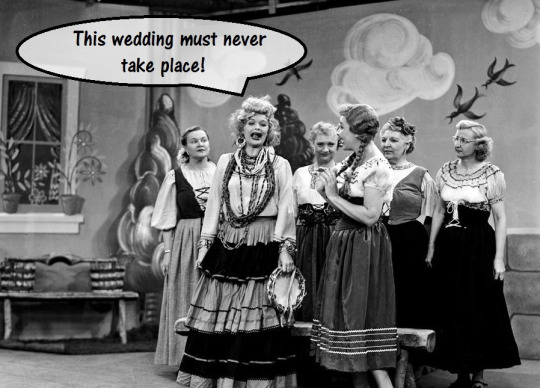
The operetta contains an original score by Eliot Daniel that features “The Pleasant Peasant Girls", "The Good Squire Quinn", "Lily of the Valley", "Queen of the Gypsies", "The Troops of the King", and "Good Prince Lancelot". Lucy plays Camille, the snaggle-toothed crone. Ethel is cast as Lily (of the Valley), Ricky is (the good) Prince Lancelot, and Fred is (what else) Friar Quinn of the Inn on the River Out. The ladies of the Wednesday Afternoon Fine Arts League (including Myra Marsh and Betty Jaynes) are the chorus.
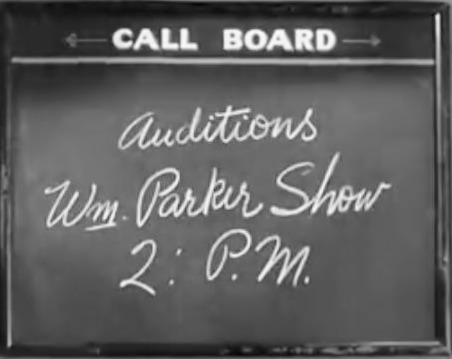
“The Professor and the Co-Ed”
“Lucy Has Her Eyes Examined” (1953) ~ A new Broadway musical is casting and Lucy and the Mertzes want to land parts. Unfortunately, Lucy’s eye exam leaves her a nearsighted mess just before the big audition.

Ethel translates the Variety headline for Lucy: “Parker Preps Prod for Pitts Preem” as “Parker Prepares Production for Pittsburgh Premiere.” The article goes on to say “William Parker, formerly legit prod, currently top pic exec, seeks thesps for flesh tuner.” Ethel doesn’t translate this section, but it means that “William Parker, formerly a theatrical producer, currently a top motion picture executive, is casting actors for a live stage musical.”
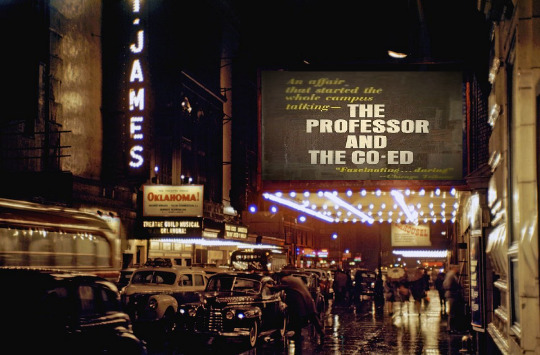
Although we never see the musical itself (just the auditions) it is a musical comedy set in the 1920s titled “The Professor and the Co-Ed” and it sounds reminiscent of Good News, a real-life 1927 legit tuner (Varietyese for 'stage musical’) also set on a college campus in the roaring '20s. Good News was made into a film in 1930 and then remade in 1947.
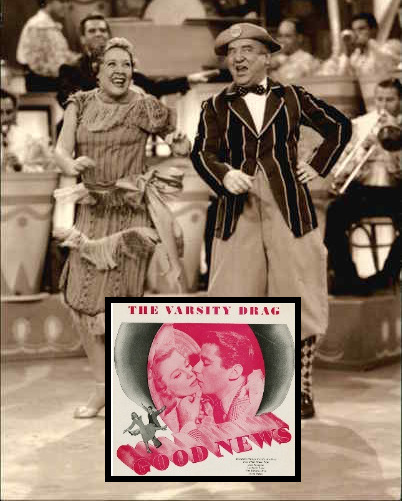
All three versions of Good News include the song "The Varsity Drag,” which Fred and Ethel sing in this episode. A musical about college co-eds must have been familiar territory to the Arnazes. Too Many Girls was Desi Arnaz’s 1939 Broadway debut and the 1940 film version introduced (literally) Desi to Lucy.
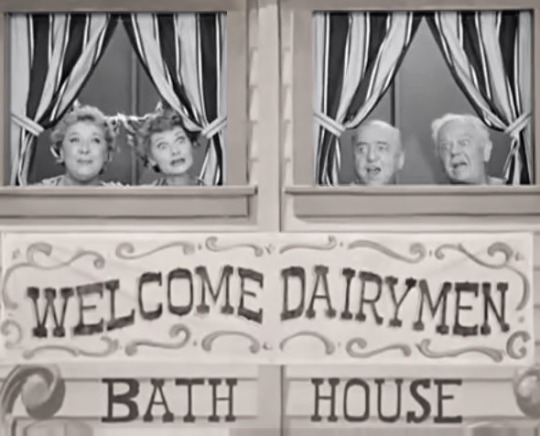
“Gay ‘90s Revue”
“Mertz and Kurtz” (1954) ~ Fred's old vaudeville partner (Charles Wininger) is in town, so the Mertzes pretend to be wealthier than they really are to impress him. But it turns out that he has been doing some pretending as well!

Perhaps not strictly a stage musical, this revue has a bit of a story and characters, so it qualifies. Set in Atlantic City, New Jersey, Fred and Barney play dairymen attending a convention, Lucy and Ethel are bathing beauties, and Ricky is the handsome lifeguard. The score includes classics from the theatre and popular music.
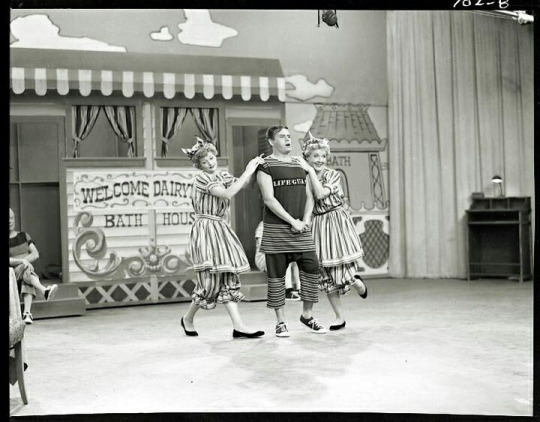
"Peach on the Beach" by Vincent Youmans and Otto Harbach was originally written for the 1925 Broadway musical No, No, Nanette which (coincidentally) starred Charles Winninger.
"By the Beautiful Sea" by Harry Carroll and Harold R. Atteridge. The song topped the early American music charts in the summer of 1914, during the outbreak of World War I. By the Beautiful Sea was also the title of a 1954 musical that was on Broadway when the episode was filmed.
“They Go Wild Over Me” by Fred Fisherin, who also wrote the lyrics for the 1919 Broadway show Irene.
"On the Boardwalk to Atlantic City" by Josef Myrow and Mack Gordon for the 1946 film Three Little Girls in Blue, about three sisters from Red Bank NJ who spend their inheritance on a trip to Atlantic City, where they hope to snare rich husbands.
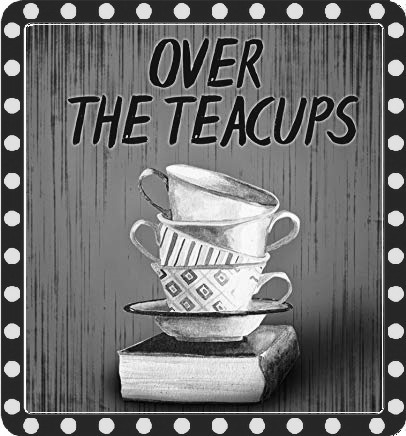
“Over the Teacups”
“Ethel’s Birthday” (1954) ~ It's Ethel's birthday and she gets two memorable presents: Hostess Pants and tickets to the theatre. An argument with Lucy over the former threatens to spoil the latter.
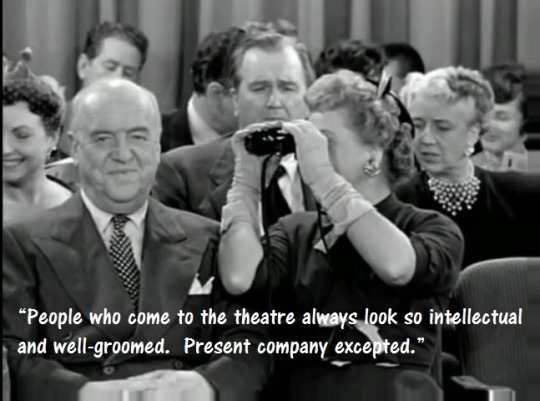
The fictional play is said to be “the biggest hit in town.” The tickets cost Ricky $6.60 each! Although we never see the actors in the play, we hear Mary Lansing as the weepy Cynthia. English actor Richard Kean voices the character of John, who breaks the news to Cynthia about the death of their mutual friend.

“Kildoonan!”
“Lucy Goes to Scotland” (1956) ~ While in London, Lucy dreams of going to her ancestral home in Scotland. Although not strictly a stage show, Lucy dreams in the musical comedy format!
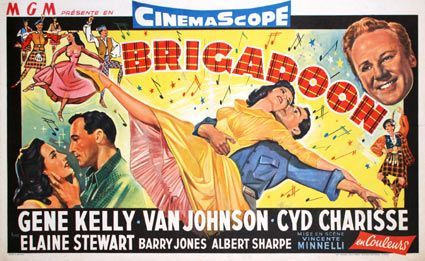
The inspiration for this episode is clearly Lerner and Loewe's 1947 musical Brigadoon. The name of the village in the musical is the similarly-sounding Kildoonan; and the two-headed dragon appears once every 30 years, just as the village of Brigadoon appears once every 100 years. Both also feature a sword dance and bagpipes. Although the show had closed in London several years earlier, the film version was released in 1954, a little over a year before this episode's filming. It was produced by MGM (the Arnazes studio of choice) and featured Van Johnson, who Lucy danced with in “The Dancing Star”.

The dream has five original songs by Eliott Daniel and Larry Orenstein (who also played the Mayor of Kildoonan): "'Tis Nae a Braw Bricht Nicht", "A McGillicuddy Is Here", "I'm in Love with a Dragon's Dinner", "Two Heads Are Nae Better Than One", and "The Dragon Waltz".
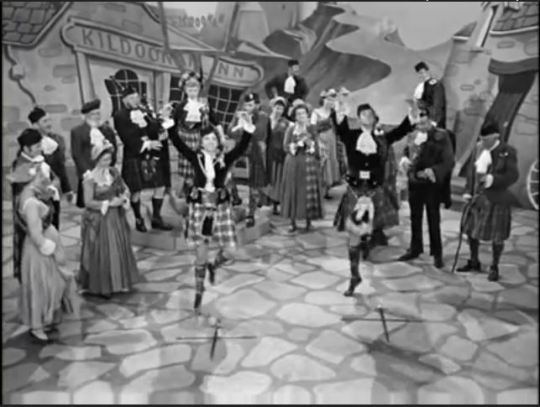
The Townspeople of Kildoonan include Betty Allen (who was a background singer for the 1954 film of Brigadoon), Betty Noyes, Norma Zimmer, John Gustafson, John Hynd, Robert E. Hamlin, Ann Ellen Walker, Dick Byron, and Chuck Schrouder.

“The Enchanted Forest”
“LIttle Ricky’s School Pageant” (1957) ~ Little Ricky is cast as the lead in his school play, with Lucy, Ricky, Fred and Ethel also getting into the act.
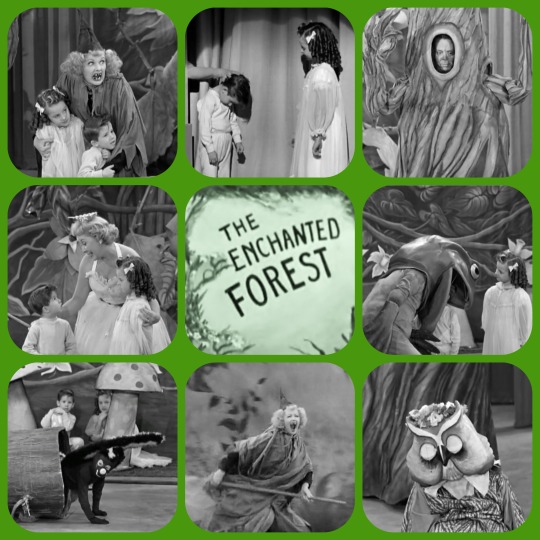
The scenery and choreography for the pageant were designed by Desi’s fishing buddy and friend Pepito Perez (aka Pepito the Clown) and his wife Joanne, who ran a nearby Dance Academy. For years afterward, Joanne used the Enchanted Forest backdrops for their productions of “Hansel and Gretel.” Their school also provided the two dozen other students for the pageant. Candy Rogers (Susie Brown) was their prize pupil so was rewarded with the female lead. Lucy played the Wicked Witch, Ricky played a Hollow Tree, Ethel plays the Fairy Princess (she fit the costume) and Fred is Hippity Hoppity the Frog. The pageant also features 12 gnomes, 12 bunnies, 3 dancing owls, and a skunk!
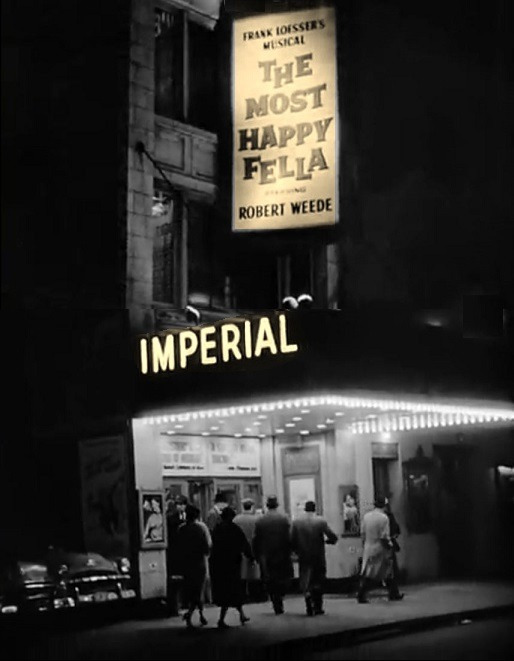
“The Most Happy Fella”
“Lucy’s Night In Town” (1957) ~ Lucy has tickets to a big Broadway musical, but she mistakenly got seats for the matinee instead of the evening show.
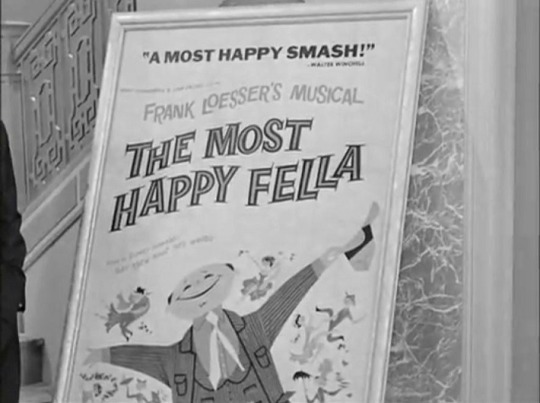
FRED (seeing the title of the play): I’ll bet he wasn’t married!
This episode takes the foursome to the Broadway musical The Most Happy Fella. Because the Arnazes were investors in the show the original cast album and show poster were used in the filming. The Frank Loesser musical was simultaneously playing at New York’s Imperial Theatre, although except for an establishing shot of the theatre’s exterior, the episode was filmed entirely in California. Coincidentally, the Imperial was where Desi Arnaz made his Broadway debut in Too Many Girls (1939). In 1979, his daughter Lucie Arnaz also made her Broadway debut at the Imperial in They’re Playing Our Song. Vivian Vance appeared there in 1941’s Let’s Face It! starring Eve Arden. The 1,443 seat theater opened in 1923 and is still in operation today.

The episode utilized the Frank Loesser songs “Standin’ on the Corner,” “Big D,” and “Don’t Cry” - all sung by the original cast: Susan Johnson, John Henson, Alan J. Gilbert, Shorty Long, Roy Lazarus, and Art Lund. Although Robert Weede is billed on the marquee, he is not heard in any of the songs, nor is leading lady Jo Sullivan, the composer’s wife, although both were nominated for 1956 Tony Awards. This is not the first Frank Loesser musical to be featured on “I Love Lucy.” A clip from the 1955 film Guys and Dolls was inserted into the MGM executives show in “Lucy and the Dummy”, but was cut for syndication and the DVD.
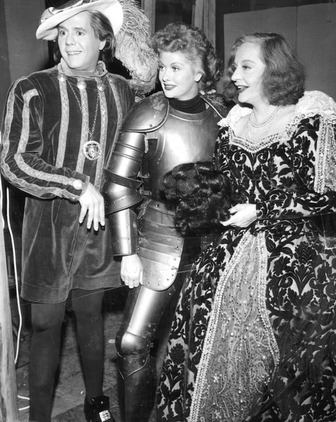
“The Queen’s Lament”
”The Celebrity Next Door” (1958) ~ Stage and screen star Tallulah Bankhead has moved in next door to the Ricardos and Mertzes! Once Lucy discovers that a celebrity is in her midst, she has gotten Bankhead and the entire gang involved with the local PTA show.
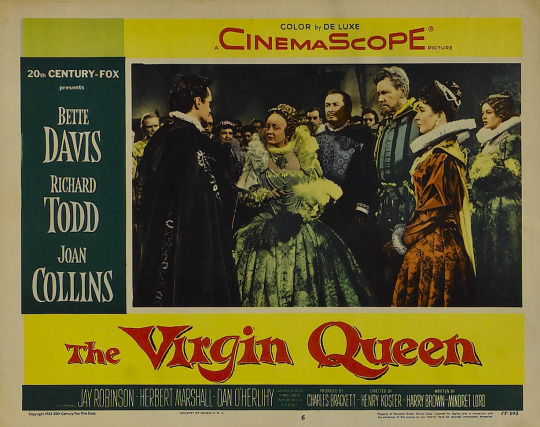
The fictional play “The Queen's Lament” is probably a hold-over from when Bette Davis was intended to be the 'celebrity next door', as she had recently played Queen Elizabeth on film in The Virgin Queen in 1955 as well as in The Private Lives of Elizabeth and Essex in 1939.
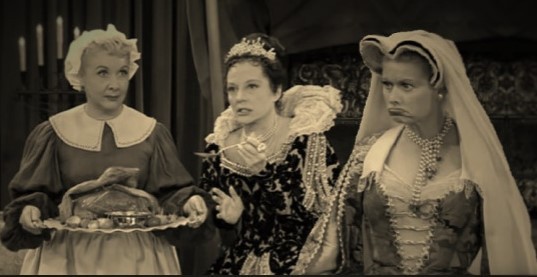
The cast and crew of the play includes: The Queen ~ Miss Tallulah Bankhead; Her Lady in Waiting ~ Lucy Ricardo; The Duke of Farthington ~ Ricky Ricardo; Genevieve, the Royal Cook ~ Ethel Mertz; A Knight ~ Fred Mertz; Musical Entertainment by the Westport Glee Club; Directed by Mrs. Ida Thompson; Written by Mr. Thompson; Costumes by Mrs. Wilson.

“Western Frolics”
“MIlton Berle Hides Out at the Ricardos” (1957) ~ Lucy wants Milton Berle to perform in the PTA play so she secretly offers her home for him to finish his latest book in peace.
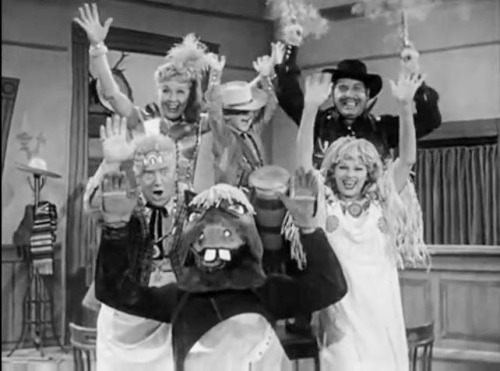
“Western Frolics” consists mostly of the musical number “Them There Days” composed by Arthur Hamilton especially for this show.
CURTAIN DOWN on Act 1
#I Love Lucy#My Favorite Husband#Lucille Ball#Desi Arnaz#William Frawley#Little Ricky#Vivian Vance#Milton Berle#Tallulah Bankhead#The Most Happy Fella#Brigadoon#The Virgin Queen#Broadway#Musicals#Plays#Sigmund Romberg#The Pleasant Peasant#Victor Herbert#Rudolf Friml#TV#Radio#Lucy#The Lucy-Desi Comedy Hour
2 notes
·
View notes
Photo

Plutus (Play)
Plutus (aka Wealth) is a play written by the great Greek comedy playwright Aristophanes in 388 BCE. It was the last of his plays to be performed during his lifetime. Like his earlier play Ecclesiazusae (The Assemblywomen), Wealth was written after the conclusion of the Peloponnesian War. Although the war was basically over, the city of Athens still suffered both economically and politically. The play centers on the status and poverty of everyday people. Aristophanes main character Chremylus, a poor Athenian, and his slave Carion are returning to the city from the Oracle of Apollo at Delphi when they meet a blind old beggar, identified later as Wealth. Upon returning to Athens with a reluctant Wealth, the social and economic structure of the city quickly changes, poverty and injustice quickly disappear. Riches are doled out to the deserving, but, unlike in his earlier plays, the rich in Wealth are not seen as virtuous and many of them lose their fortunes.
Aristophanes
Very little is known of Aristophanes' early life; even his birthdate is unclear. Since most of his plays were written between 427 and 386 BCE, it helps place his death around 386 BCE. A native of Athens, he was the son of Philippus and owned land on the island of Aegina. He had two sons, one of whom became a playwright of minor comedies. Although participating little in Athenian politics, Aristophanes was an outspoken critic, via his plays, of the Peloponnesian War between Athens and Sparta and those politicians who supported it. His portrayal and attack of the statesman Cleon in the play The Babylonians landed him in court in 426 BCE. Aristophanes opposed all changes in the traditional aspects of philosophy, education, poetry, and music. Norman Cantor in his book Antiquity said the playwright reflected the conservative opinion of many Athenians, showing them to be people who valued old simplicity and morality.
By the time Aristophanes began to write, Greek theater was in serious decline. Although Aristophanes is sometimes condemned for bringing drama down from the high level of the Greek tragedy written by Aeschylus, his plays, with their simplicity and vulgarity, have been recognized and appreciated for their rich fantasy as well as humor and indecency. Editor Moses Hadas in his book Greek Drama wrote that while Aristophanes could write poetry that was both delicate and refined; however, he could also, at the same time, demonstrate bawdiness and gaiety. To many his comedies were a blend of wit and invention. Unfortunately, with only eleven of his plays surviving, Aristophanes' works from this period are the only known examples of Old Attic Comedy to exist.
Continue reading...
33 notes
·
View notes
Photo
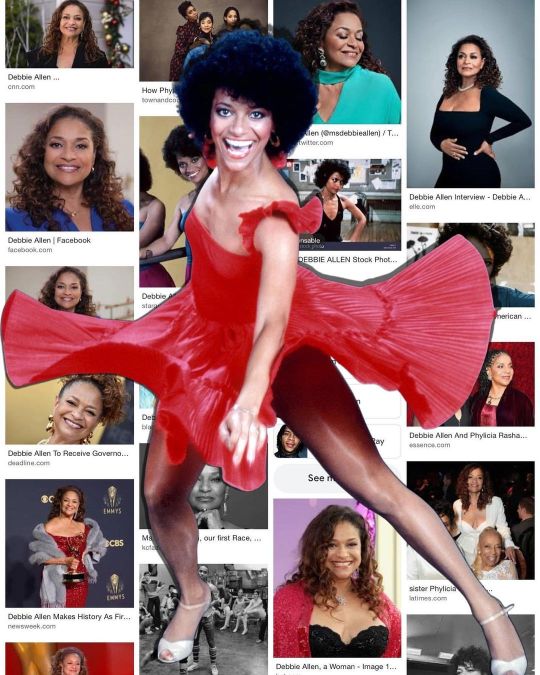
Deborah Kaye Allen (born January 16, 1950) is an actress, dancer, choreographer, singer-songwriter, director, producer, and former member of the President's Committee on the Arts and Humanities. She has been nominated 20 times for an Emmy Award, two Tony Awards, and has won a Golden Globe Award, and received a star on the Hollywood Walk of Fame. She was born in Houston, the third child of orthodontist Andrew Arthur Allen and Pulitzer Prize-nominated artist, poet, playwright, scholar, and publisher, Vivian Allen. She earned a BA in classical Greek literature, speech, and theater from Howard University and studied acting at HB Studio. She was a member of Chi Delta Mu Health Professional Fraternity. She holds honoris causa doctorates from Howard University and the University of North Carolina School of the Arts. She is known for her work in the musical-drama television series Fame. For this role in 1983, she received a Golden Globe Award for Best Actress – Television Series Musical or Comedy and two Primetime Emmy Awards for Outstanding Choreography and was nominated for four Primetime Emmy Awards for Outstanding Lead Actress in a Drama Series. She began working as a director and producer, most notably producing and directing 83 of 144 episodes of A Different World. She returned to acting playing the leading role in In the House and began playing in Grey's Anatomy and serving as an executive producer/director. She has directed more than 50 television and film productions. She opened the Debbie Allen Dance Academy in Los Angeles, where she teaches young dancers. She married former NBA player Norm Nixon; the couple has three children: dancer Vivian Nichole Nixon (who played Kalimba in the Broadway production of Hot Feet) basketball player Norman Ellard Nixon Jr. (Wofford College & Southern University), and DeVaughn Nixon. She married Win Wilford (1975-1983). She is the sister of actress/director/singer Phylicia Rashad, Tex Allen (Andrew Arthur Allen III), a jazz composer, and Hugh W. Allen, a real estate banker/actor. #africanhistory365 #africanexcellence https://www.instagram.com/p/CnehdT4Ly1p/?igshid=NGJjMDIxMWI=
2 notes
·
View notes
Text
Poetic Patron Saints: Celebrating Influential Figures in Poetry's History with Herve Comeau Syracuse
Poetry, a timeless art form, has shaped cultures and societies throughout history, giving voice to the human experience in its most distilled and evocative form. Across the ages, certain figures have emerged as titans of this literary craft, their works leaving an indelible mark on both their contemporaries and future generations. These influential poets, whom we might regard as the patron saints of poetry, have each contributed uniquely to the evolution and richness of poetic tradition. In this blog, we will explore the lives and legacies of six seminal poets, celebrating their enduring influence on the world of poetry.
Homer: The Epic Foundation
Homer, often considered the father of Western literature, composed the epic poems "The Iliad" and "The Odyssey." These works are not only foundational texts of ancient Greek literature but also cornerstones of the Western literary canon. Homer's masterful use of dactylic hexameter and his ability to weave complex narratives have inspired countless poets and writers throughout history.
"The Iliad" and "The Odyssey" explore themes of heroism, fate, and the human condition, resonating deeply across centuries. Poetry lovers like Herve Comeau Syracuse mention that Homer's influence extends beyond literature into various art forms, including theatre, music, and visual arts. His epics have been translated into numerous languages and adapted into various media, demonstrating the timeless appeal and universal relevance of his storytelling.
Dante Alighieri: The Divine Visionary
Dante Alighieri, an Italian poet of the Middle Ages, is best known for his monumental work, "The Divine Comedy." This epic poem, written in vernacular Italian, comprises three parts: "Inferno," "Purgatorio," and "Paradiso." Dante's vivid and imaginative depiction of the afterlife, combined with his profound philosophical and theological insights, has cemented his status as one of the greatest poets of all time.
Poetry buffs such as Herve Comeau Syracuse convey that "The Divine Comedy" is celebrated not only for its literary brilliance but also for its influence on the Italian language and its role in shaping Western thought. Dante's intricate use of allegory and his exploration of themes such as justice, redemption, and the human soul have inspired generations of poets, scholars, and artists. His work remains a crucial reference point in the study of literature and medieval culture.
William Shakespeare: The Bard of Avon
William Shakespeare, often referred to as the Bard of Avon, is perhaps the most famous poet and playwright in the English language. His extensive body of work includes 154 sonnets and numerous plays, which have had a profound impact on English literature and drama. Shakespeare's inventive use of language, mastery of poetic forms, and deep understanding of human nature have made his works timeless.
Shakespeare's sonnets, in particular, are celebrated for their exquisite beauty and emotional depth. They explore themes of love, beauty, politics, and mortality, offering insights that continue to resonate with poetry lovers like Herve Comeau Syracuse today. His influence extends beyond literature to the broader culture, with countless adaptations of his works in various forms, including theatre, film, and opera.
Johann Wolfgang von Goethe: The Universal Genius
Johann Wolfgang von Goethe, a German poet, playwright, and novelist, is regarded as one of the most important figures in Western literature. His works, which include "Faust," "The Sorrows of Young Werther," and numerous lyrical poems, reflect his profound intellectual curiosity and his ability to blend classical and romantic elements in his writing.
Goethe's exploration of themes such as individualism, nature, and the pursuit of knowledge has left a lasting impact on the literary world. His concept of "Weltliteratur" (world literature) emphasizes the importance of cross-cultural exchange and has influenced literary scholarship and cultural studies. Goethe's legacy endures not only in Germany but also globally, as his works continue to be studied, translated, and celebrated.
Emily Dickinson: The Reclusive Innovator
Emily Dickinson, an American poet known for her reclusive lifestyle and innovative style, has become one of the most revered figures in American literature. Despite having only a few of her poems published during her lifetime, Dickinson's posthumously published work has garnered immense acclaim for its originality, depth, and emotional intensity.
Dickinson's poetry is characterized by its unconventional use of punctuation, capitalization, and meter, as well as its exploration of themes such as death, nature, and the inner life. Her concise yet profound observations have influenced countless poets and have earned her a place among the literary greats. Dickinson's work continues to inspire and resonate with poetry buffs such as Herve Comeau Syracuse, offering a unique perspective on the human experience.
Pablo Neruda: The People's Poet
Pablo Neruda, a Chilean poet, is renowned for his passionate and sensuous poetry, as well as his political activism. Neruda's extensive body of work, which includes "Twenty Love Poems and a Song of Despair," "Canto General," and numerous other collections, reflects his deep connection to the human condition, nature, and social justice.
Neruda's ability to capture the beauty of everyday life and his commitment to using poetry as a tool for political expression have made him a beloved figure worldwide. His work has been translated into many languages, bringing his powerful voice to a global audience. Neruda's legacy as a poet who spoke for the people and championed social causes continues to inspire writers and activists around the world.
The history of poetry is rich with the contributions of remarkable individuals who have shaped and defined the art form. From Homer's epic tales to Neruda's passionate verses, these poetic patron saints have left an indelible mark on literature and culture. Their works continue to inspire, challenge, and move poetry enthusiasts including Herve Comeau Syracuse, underscoring the enduring power and relevance of poetry. As we celebrate these influential figures, we recognize the timeless nature of their contributions and the lasting impact they have on the world of poetry and beyond. By understanding and appreciating the legacies of these poets, we can deepen our connection to the art of poetry and find inspiration in their words for generations to come.
0 notes
Text








Happy 58th Birthday to the multi-talented Scottish actor Alan Cumming born on January 27, 1965 in Aberfeldy.
Alan Cumming has an amazing volume of work under his belt, last year alone he was involved in 8 different projects and TV and Cinema, add to that he appears on stage, writes, produces, directs things, as you'd imagine there is a lot to go through in his bio.........
Born to Mary (Darling), an insurance company secretary, and Alex Cumming. a forester for Atholl Estate, Alanspent his infant years in Dunkeld before the family moved to Fassfern near Fort William, before moving to the east coast of Scotland in 1969, where Alan's father took up the position of Head Forester of Panmure Estate; it was there that Alan grew up. He went to Monikie Primary School and Carnoustie High School, where he began appearing in plays, and soon after that began working with with the Carnoustie Theatre Club and Carnoustie Musical Society, and never looked back.
In 1981, he left high school with some great exam results in several subjects, but because he was too young to enter any university or drama school he worked for just over a year as a sub-editor at D.C. Thomson Publishers in Dundee. There he worked on the launch of a new magazine, “Tops”, and was also the “Young Alan” who answered readers’ letters.
In September 1982 he began a three-year course at the Royal Scottish Academy of Music and Drama in Glasgow. He graduated in 1985 with a B.A. (Dramatic Studies) and awards for verse speaking and direction. He also had formed a cabaret double act with fellow student Forbes Masson called Victor and Barry, which went on to become hugely successful with tours (including two Perrier Pick of the Fringe seasons in London and a month-long engagement at the Sydney Opera House as part of an Australian tour), records and many TV appearances throughout the British Isles. Before graduating Alan made his professional theatre and film debuts in Macbeth at the Tron Theatre in Glasgow and in Gillies MacKinnon’s Passing Glory.
After graduating, Alan worked extensively in Scottish theatre and television, including a stint on the soap opera High Road before moving to London when Conquest of the South Pole, a play by German playwright Manfred Karge, transferred from the Traverse Theatre in, Edinburgh to the the Royal Court in London, earning him his first Olivier award nomination for Most Promising Newcomer of 1988.
Alan performed with the Royal Shakespeare Company and then the Royal National Theatre, where he starred in Accidental Death of an Anarchist, which he also adapted with director Tim Supple. The production was nominated for Best revival at the 1991 Olivier awards and Alan won for Comedy Performance of the Year. His film career began with Ian Sellar’s Prague , in which he starred with Sandrine Bonnaire and Bruno Ganz. The film premiered at the 1992 Cannes film festival and went on to win him Best Actor award at the Atlantic Film Festival and a Scottish BAFTA Best Actor nomination. In the same year he made two films for the BBC.
In the 1992 Olivier awards got his second nomination for Comedy Performance of the Year for La Bete. The next year he played Hamlet for the English Touring Theatre to great critical acclaim going on to play the Emcee in Sam Mendes’ revival of Cabaret. He received a 1994 Olivier award nomination for Best Actor in a Musical for “Cabaret”, and for Hamlet he received the 1994 TMA Best Actor award and a Shakespeare Globe award nomination.
In 1994, he made his first Hollywood film, Circle of Friends then two films released in quick succession Emma and GoldenEye as a talented hacker, Boris Grishenko, these films brought him to be noticed by further American producers, and he appeared in several Hollywood films, such as Romy and Michele’s High School Reunion and Buddy.
Returning home briefly in 1997 to work with Stanley Kubrick and the Spice Girls before reprising his role in Cabaret on Broadway. The show and his portrayal were a sensation, and he received the many plaudits and awards for his performance including a Tony for Best Actor in a Musical
Since then he has alternated between theatre and films, and also between smaller independent films and more mainstream fare.His films include Julie Taymor’s Titus, the Spy Kids trilogy, X-Men 2, Son of the Mask and the Showtime movie musical Reefer Madness: The Movie Musical, and Battle of the Sexes.
Cumming’s TV work includes Taggart, of course! The short lived Scottish sitcom The High Life, Travelling Man, Third Rock from the Sun, Sex and the City, Foyles War and Dr Who. He is probably best known for starring in the US legal and political drama The Good Wife
Alan lives in Manhattan with his husband, illustrator Grant Shaffer, he has been nominated and won too many awards to mention here, and has champion causes for the LGBT community worldwide. He published a novel,, Tommy’s Tale in 2002, centring on the life of a bisexual guy living in London, and his biography Not My Father’s Son, Cumming describes the emotional and physical violence his father inflicted on him in his childhood, he became estranged from his father in his early 20′s and it wasn’t until filming Who Do You Think You Are in 2010 he spoke to him, his father telling him he suspected he wasn’t his biological father, Alan, along with his brother later had DNA tests which proved they were indeed his biological children.
Alan today went up in my estimations when he announce he was sending back the OBE he was awarded in 2009 due to "the toxicity of empire".
He explained it in full on his Instagram account, posting;
Today is my 58th birthday and I want to tell you about something I recently did for myself. I returned my OBE. Fourteen years ago, I was incredibly grateful to receive it in the 2009 Queen’s birthday honours list, for it was awarded not just for my job as an actor but ‘for activism for equal rights for the gay and lesbian community, USA’. Back then the Defence of Marriage Act ensured that same sex couples couldn’t get married or enjoy the same basic legal rights as straight people, and Don’t Ask, Don’t Tell ensured that openly gay, lesbian or bisexual people were barred from serving in the military. (Incidentally both these policies were instituted by the Clinton administration). This is the statement I made at the time: ‘I am really shocked and delighted to receive this honour. I am especially happy to be honoured for my activism as much as for my work. The fight for equality for the LGBT community in the US is something I am very passionate about, and I see this honour as encouragement to go on fighting for what I believe is right and for what I take for granted as a UK citizen. Thank you to the Queen and those who make up her Birthday honours list for bringing attention to the inaction of the US government on this issue. It makes me very proud to be British, and galvanised as an American’. The Queen’s death and the ensuing conversations about the role of monarchy and especially the way the British Empire profited at the expense (and death) of indigenous peoples across the world really opened my eyes. Also, thankfully, times and laws in the US have changed, and the great good the award brought to the LGBTQ+ cause back in 2009 is now less potent than the misgivings I have being associated with the toxicity of empire (OBE stands for Officer of the British Empire). So I returned my award, explained my reasons and reiterated my great gratitude for being given it in the first place. I’m now back to being plain old Alan Cumming again. Happy birthday to me!
If you want to see Alan let loose in oor ain land check out Channel 4’s Miriam & Alan: Lost In Scotland where we see the esteemed actor venturing around his native Scotland in a mobile home, with a new friend in tow – fellow thespian, the 80-year-old super Miriam Margolyes. The second series saw then explore the US.
I have to say I hope I look in as good shape as Alan when I reach my 58th birthday........but with just over 4 months left it's not going to happen is it!
43 notes
·
View notes